- Home
- Ann M. Martin
Dawn Schaffer Undercover Baby-Sitter Page 2
Dawn Schaffer Undercover Baby-Sitter Read online
Page 2
On to the next memory picture: my sister, best friend, and fellow BSC member, Mary Anne. She was sitting on the end of Claudia’s bed, next to Stacey. I saw her laugh at something Kristy had just said, and her whole face lit up. Snap! That’s when I took my picture. Not that I really need one of Mary Anne. We’re so close that she’s always in my heart.
Mary Anne, by the way, is the club’s secretary, and she does an awesome job. She keeps track of all our schedules and could tell you immediately which of us would be free for a sitting job from two-thirty until five a week from next Thursday.
In fact, Mary Anne swung into action as I was watching her, when Kristy answered a call from a new client, a Mrs. Cornell. She needed a sitter that Saturday afternoon for her two children, and she told Kristy she lived at 159 Green House Drive, which is in Kristy’s neighborhood. She called the place “Livingston House.”
Mary Anne found that Kristy and I were the only club members available, and Kristy said she had plans for that day, so Mary Anne signed me up for the job and Kristy called Mrs. Cornell back. That’s the BSC in action. Simple, no?
These days my official position in the BSC is as an honorary member. I used to be the alternate officer, though, which meant that I would cover for any other member who couldn’t make it to a meeting. That office is now held by the newest member of the BSC, Abby Stevenson. She and her twin sister, Anna, moved to Stoneybrook after I moved away, so I don’t know either of them too well. I do know that they came here from Long Island with their mom, and that their dad died in a car wreck when they were nine. Anna’s not in the BSC; she’s way too busy with her music. I hear she’s awesome on the violin.
My memory picture of Abby would show a laughing girl with deep brown eyes and long, curly, thick, dark hair. Abby’s full of fun, but I sometimes see a sadness in her eyes. I guess it’s because she misses her dad.
Abby doesn’t talk about him much. Instead, she talks about everything else — at a mile a minute. She’s always cracking jokes, lots of which are at her own expense. For example, she likes to make fun of her allergies and asthma, which are actually serious business (she had to go to the emergency room for an asthma attack not long ago). She doesn’t like to take her health problems too seriously, though, and she definitely doesn’t like to let them slow her down. She’s great at sports; Kristy says she’s a natural athlete.
Abby and her sister recently turned thirteen, which makes them the same age as most of the rest of us in the BSC. The only younger members are Jessi Ramsey and Mallory Pike, who are both eleven. They’re our junior officers, which means they mostly take afternoon jobs. They’re not allowed to baby-sit at night except for their own families.
My memory picture of Jessi would show a slim African American girl with dark hair and eyes and long, strong arms and legs. Jessi’s a very advanced ballet student, and it shows in her elegant bearing. But she’s also a regular girl, one who loves to read horse books and giggle and tell secrets to her best friend, who happens to be Mallory.
I guess my memory picture would probably show the two of them together, since they’re rarely apart. That day, for example, they were sprawled on Claudia’s rug together. So, next to Jessi my picture would show a girl with curly chestnut hair and blue eyes framed by glasses. Mal has a great sense of humor, but she often looks serious. Maybe it’s because she’s thinking about her writing. Mal loves to write, but it’s hard for her to find a quiet moment for it; she has seven younger brothers and sisters! (Jessi, on the other hand, has only two: a younger sister and a baby brother.)
There are two other members of the BSC, Shannon Kilbourne and Logan Bruno (Mary Anne’s boyfriend), but neither of them was in Claudia’s room that day. They’re associate members, which means that while they don’t come to meetings regularly, they are on call if we need extra help. My memory picture of Shannon would show a blonde girl with high cheekbones, and the picture would probably be blurred, because Shannon’s always on the run. She keeps very busy with clubs and other after-school activities; even during the summer she’s usually pretty booked up. Logan’s picture would show an athletic, funny guy — and naturally he’d be holding Mary Anne’s hand.
As you can see, my memory album is well filled. I’ll carry those memory pictures of my BSC friends with me when I go back to California, and I have the feeling they’ll be carrying memory pictures of me, too.
Oh, one last thing about the meeting that day. A sort of weird thing. We received another call toward the end of the meeting, from a Mrs. Keats. She was looking for a sitter for her three kids for Saturday afternoon — and she gave us the same address that Mrs. Cornell had given us! At first we were confused. Were two members of the same family calling by mistake? Or did they really need two sitters for simultaneous jobs at the same house? Since Mrs. Keats said she had three kids and Mrs. Cornell had mentioned two, we figured there were two different groups of kids, so in the end Kristy took the second job, giving up her plans for the day. I was glad; having her there would make the job even more fun. Suddenly, I couldn’t wait to meet our new clients.
I looked over at Kristy, and she looked back at me. She raised her right eyebrow about an eighth of an inch.
I know Kristy very well, well enough to translate her eyebrow-raises. That one meant, “This is majorly weird.” I gave her the tiniest nod, to show I agreed.
The two of us were seated in a pair of humongous, overstuffed armchairs, which faced each other across a room full of other humongous, overstuffed furniture. We were in Livingston House, waiting to meet our newest clients.
We’d arrived on time (of course), and as we stood on the wide marble front steps I felt a little nervous. I wondered if Kristy did, too. She’s used to living in a fancy neighborhood, but Livingston House is quite a few steps above Watson Brewer’s place. I mean, this place looks like a certain large white house we’ve all seen pictures of. You know, the one at 1600 Pennsylvania Avenue, in Washington D.C.? Well, Livingston House may not be the home of presidents, but it sure is impressive. It’s this enormous white structure, with pillars and two-story-high windows all along the front. The grounds — you can’t call that much land a yard — are awesome, too. Rolling green lawns, flower beds bursting with blooms, perfectly manicured shrubs — the whole bit. There are statues everywhere, and I saw two fountains spouting water. Kristy told me she’d heard about an Olympic-sized pool out back, with a pool house bigger than most people’s regular houses.
Anyway, we knocked on the oversized red door, using the brass knocker, which was shaped like the head of a lion. I heard footsteps approaching from inside, and I wondered whether Mrs. Cornell or Mrs. Keats would answer the door.
Neither one did.
Instead, the door swung open to reveal a really cute older guy with dark hair, dark eyes, and a neatly trimmed dark beard and mustache.
He looked at Kristy, then at me, and raised his eyebrows. “Yes?” he said.
“We’re — uh —” I began. Somehow the words wouldn’t come out right.
Kristy tried next. “Is Mrs. — um, Mrs. —” Obviously, the guy’s dark gaze was affecting her as well, which was unusual for Kristy. She couldn’t even remember her client’s name!
Just then, the guy finally cracked a smile. “You must be the baby-sitters,” he said, nodding at the decorated Kid-Kit we each carried. (I had a feeling he’d known that all along, and was just giving us a hard time.) “Come on in.”
He stepped back from the door and motioned us into the foyer, which was about as big as the living room of my Stoneybrook house.
“Some front hall,” Kristy muttered under her breath. I noticed her looking around, taking in the black-and-white-tiled floor, the fancy red and gold chairs against the wall, the immense brass coatrack.
“This way, please,” said the dark-haired man. He led us through one of the many doorways leading off the hall and ushered us into the room with the humongous furniture. There was a fireplace, too, lots of oriental rugs, and a bunch of spindl
y but very expensive-looking little tables.
Hanging above the fireplace was a huge portrait in a fancy gold frame. A nameplate on the bottom of the frame identified the person pictured as Arthur Livingston. It was a good thing the picture had a caption. It was the ugliest painting I’d ever seen, and if I hadn’t been able to read that it was a picture of a man I might never have figured it out. He looked like a cross between George Washington, Whistler’s Mother, and the Elephant Man. The colors were awful, the background was a mess of blurry brush strokes, and the artist clearly hadn’t known very much about how to paint noses. Or hands. Or mouths. I looked at the painting, fascinated with its repulsiveness. Kristy was staring at it, too.
“It is rather ugly, isn’t it?” observed the man who had let us in. “There are dozens of portraits of Mr. Livingston around the house. He had one painted every year of his married life.” He looked at the painting again and grimaced. “This is probably the worst of them all,” he said, shaking his head. “Now, where are Mrs. Cornell and Mrs. Keats?”
Just what I’d been wondering.
As if on cue, we heard footsteps in the hall and then the door to the room swung open and two women — both around my mom’s age — entered the room. They were tall, with reddish-brown hair and clear blue eyes. Though they had come in together, there seemed to be some almost-physical force keeping them at arm’s length. Each seemed alone because of the way they barely acknowledged each other.
“Ah, you must be Dawn,” said one, at the same time that the other one said, “Welcome, girls. Which one of you is Kristy?”
They stopped and glared at each other, each waiting for the other to start speaking again.
As Kristy said later, it would have been funny if it hadn’t been so awkward.
Neither of us knew what to do, so we just stood there. Finally, one of the women — the one who had mentioned my name — said, “I’m Mrs. Cornell. And this is Mrs. Keats.” She gestured vaguely toward the other woman. “And I see you’ve already met Mr. Irving, our butler.”
Butler? I saw Kristy’s eyebrow twitch, and I knew exactly what she was thinking. I was thinking the same thing. How could such a young guy be a butler?
“Please, call me John,” said Mr. Irving with a smile.
Mrs. Cornell shot him a cold glance. She didn’t seem to appreciate his friendliness.
Hoping to head off any unpleasantness, I jumped right in. “I’m Dawn Schafer,” I said, “and this is Kristy Thomas.”
“Baby-sitters Club, at your service,” added Kristy, grinning.
Neither of the two women returned her smile, but both of them nodded to us.
Then Mrs. Keats spoke up. “My sister and I are here in Stoneybrook to straighten up our late father’s estate.” She looked up at the portrait of Arthur Livingston. “He passed away about a year ago.”
Kristy and I glanced at each other. So, the two women were sisters. That made the kids we were going to sit for cousins.
“Our husbands are home, working, so while we’re here,” Mrs. Keats continued, “we are going to need qualified, responsible baby-sitters for our children. I must say that your club came highly recommended.” She sniffed. “I hope you’ll live up to your advance billing.”
I had the feeling she doubted that we would. Nothing like being judged before you even begin a job.
“In any case,” she concluded, “we would appreciate it if you would keep our children apart while you are sitting. It will make things easier for all parties involved.” She gave another sniff — one that sounded slightly accusing, to my mind.
“Don’t the children like to play together?” I asked, without stopping to think. After all, they were cousins. You’d think they’d be friendly.
“I think you’ll find they prefer it this way,” said Mrs. Cornell, who was glaring at her sister. “Some of the children are prone to arguing at times.”
“Only if they’re provoked!” snapped Mrs. Keats.
“Well,” said Kristy, stepping forward. “We’d love to meet our new charges.” I could tell she was trying to head off an argument.
Both women stepped back a little, and nodded. “Of course,” said Mrs. Keats. “Why don’t you come with me, Kristy?”
“And you can come with me,” Mrs. Cornell said to me.
Kristy and I exchanged one more glance, and that was the last I saw of her until our job was over and we met downstairs in the foyer.
Later, she told me everything that had happened.
Apparently, the sisters had divided the house into two parts for the duration of their stay. It wasn’t hard to do, since the place was so enormous. Basically, the wing to the left of the front door belonged to the Keats family, while the wing to the right was where the Cornells were camped out.
Mrs. Keats led Kristy up a wide staircase, down a hall, and up another staircase. On the way up the second set of stairs, they passed a woman who looked a lot like Mrs. Keats and Mrs. Cornell, only younger. The two women nodded to each other, but didn’t stop to talk. When Kristy and Mrs. Keats reached the top of the stairs, Mrs. Keats explained that the woman on the stairs was their younger sister, Amy, who had been living with their father until just before he died. (Kristy didn’t see Amy again for the rest of the day. Neither she nor John, the butler, seemed to have any part in the care of the children.)
Mrs. Keats then showed Kristy into a large, sunny playroom, and introduced her to the kids: Eliza, nine, Hallie, seven, and Jeremy, the youngest, five. They all had their mother’s reddish hair and blue eyes.
Kristy reported that the kids seemed normal, despite all the weirdness in the house. They were playing Pogs when she showed up, and they invited her to join in. As soon as Mrs. Keats left the room, they began to bombard Kristy with questions about their cousins.
“Did you see them?” demanded Eliza.
“What are they like?” asked Hallie.
“Are they mean?” asked Jeremy, a little timidly.
“No, of course not,” said Kristy, even though she hadn’t met the Cornell children. “They’re just like you.”
“Then why did we fight with them?” asked Eliza. “Mom says that the last time we were together, we had a huge fight. I barely remember it. I can hardly remember my cousins at all, except for maybe Katharine. She’s the older one.”
Kristy had a feeling that if there had been a fight, it had been fueled by the feuding sisters. Otherwise, wouldn’t the cousins remember what they’d fought about?
Since she couldn’t answer any more questions about the Cornell kids, Kristy diverted the three Keats children by showing them the contents of her Kid-Kit, and the afternoon passed with no further incidents. But Kristy couldn’t help thinking, as she watched the three kids playing happily together, how great it would be to introduce all the Livingston grandchildren to each other — with no angry adults around.
I was thinking the same thing, over in the Cornell wing. I’d met Katharine, who at nine was the same age as Eliza, and Tilly, who was six. Both of them had what Kristy and I were realizing was the “Livingston look”: tall, with reddish hair and blue eyes. They were great kids, and they wanted to know all about their cousins.
When Kristy and I talked about it later, we tried to figure out some way to bring the cousins together. Kristy even considered suspending the BSC rule about having two sitters for more than four children. If the BSC sent only one sitter to Livingston House, the kids would have to play together, whether the sisters liked it or not. But, as Kristy pointed out, that rule is there for a reason. It’s really not safe for one sitter to watch five kids. Still, there had to be a way. It just didn’t seem right to deny the kids the fun of playing together because their mothers couldn’t act like a family.
Normally, I become very bored very quickly when adults stand around talking and talking and talking in that endless, monotonous way that only adults can manage.
But listening to my stepfather Richard’s conversation with Lyn Iorio was a different matter. I didn
’t tune out. I didn’t roll my eyes up to the sky. I didn’t stand there wishing I had my Walkman. Instead, I listened to every word. Why? Well, because they were talking about a topic that interested me — a lot. They were talking about the strange happenings at Livingston House.
It was that same Saturday, and Kristy and I had just said good-bye to our new clients. Kristy had run home for dinner, and I headed for Richard’s car, which was parked across the street from the long driveway leading to Livingston House. He had come to pick me up, and, as always, he was on time. As I neared the car, I saw that he was leaning against it, talking to a woman with a perfect blonde pageboy hairdo. She was dressed in sweats and running shoes, and it looked as if she’d just finished jogging. She was sipping from one of those plastic water bottles, and her face was pink.
Richard looked up and saw me approaching. “Ah, there she is,” he said, smiling at me. “Lyn, this is Dawn. Dawn, this is Lyn Iorio. She’s a neighbor of your clients.”
“Nice to meet you, Dawn,” said Ms. Iorio, sticking out her hand.
I shook it. “Nice to meet you, too.”
“Lyn is a lawyer,” said Richard. “A very good one, too. We’ve worked together many times over the years. Right now she happens to be working for the same people you are.”
I wasn’t sure what he meant. “You’re working for Mrs. Cornell?” I asked.
“Sort of,” she answered with a smile. “Actually, I’m working for her father, even though he has passed away. I’m the executor of his estate, which means I have to make sure that his will is carried out exactly as he wanted it to be.”
“You knew him quite well, didn’t you?” Richard asked her.
“I was close friends with Mrs. Livingston,” she replied. “I think Arthur liked knowing that I had a personal connection to his family.”
“So you know Mrs. Keats and Mrs. Cornell?” I asked. “And Amy Livingston?”
“Sure,” said Ms. Iorio. “I’ve known them since they were little girls. They never did have a great relationship, even then.” She lowered her voice. “And from what I hear,” she added, “the squabbles they used to have as children are nothing compared to the fights they’re having now.”

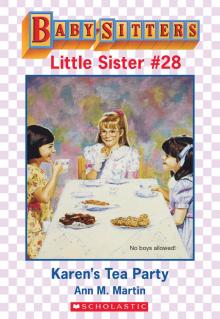 Karen's Tea Party
Karen's Tea Party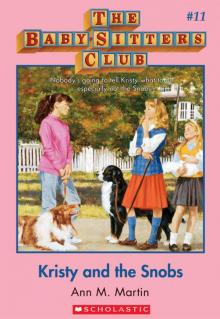 Kristy and the Snobs
Kristy and the Snobs Best Kept Secret
Best Kept Secret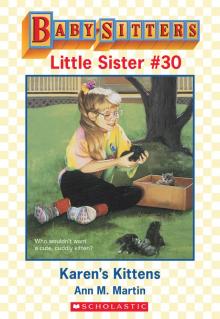 Karen's Kittens
Karen's Kittens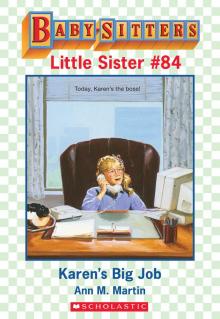 Karen's Big Job
Karen's Big Job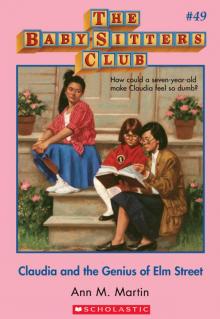 Claudia and the Genius of Elm Street
Claudia and the Genius of Elm Street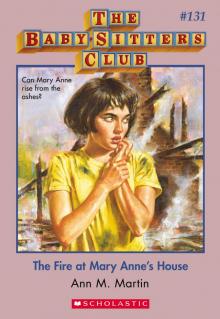 The Fire at Mary Anne's House
The Fire at Mary Anne's House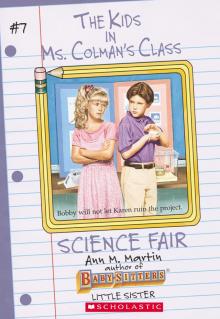 Science Fair
Science Fair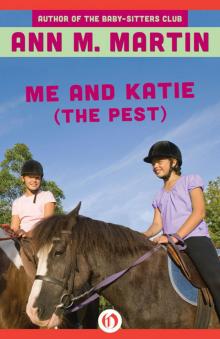 Me and Katie (The Pest)
Me and Katie (The Pest)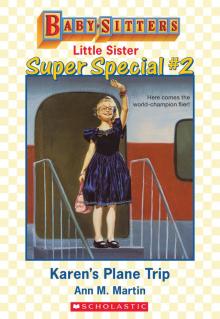 Karen's Plane Trip
Karen's Plane Trip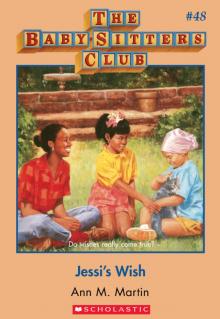 Jessi's Wish
Jessi's Wish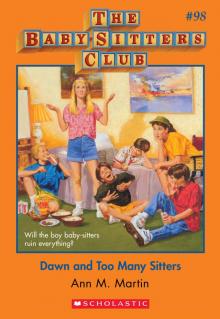 Dawn and Too Many Sitters
Dawn and Too Many Sitters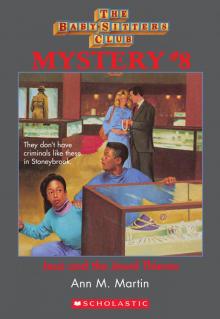 Jessi and the Jewel Thieves
Jessi and the Jewel Thieves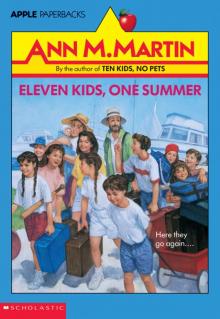 Eleven Kids, One Summer
Eleven Kids, One Summer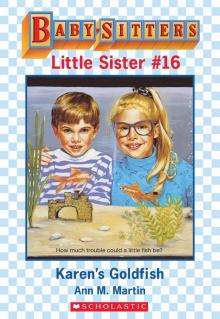 Karen's Goldfish
Karen's Goldfish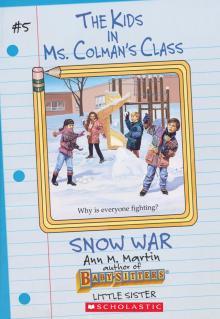 Snow War
Snow War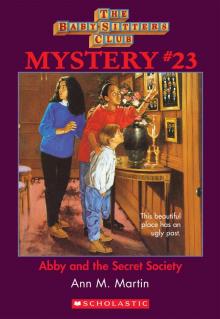 Abby and the Secret Society
Abby and the Secret Society Keeping Secrets
Keeping Secrets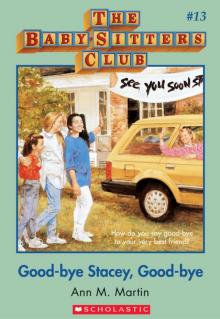 Good-Bye Stacey, Good-Bye
Good-Bye Stacey, Good-Bye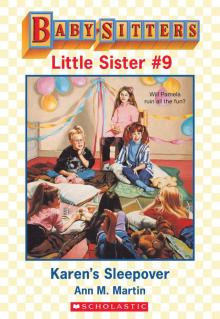 Karen's Sleepover
Karen's Sleepover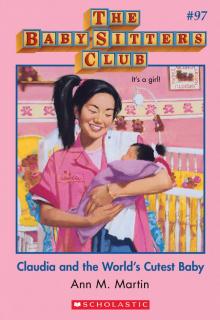 Claudia and the World's Cutest Baby
Claudia and the World's Cutest Baby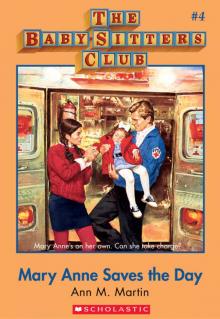 Mary Anne Saves the Day
Mary Anne Saves the Day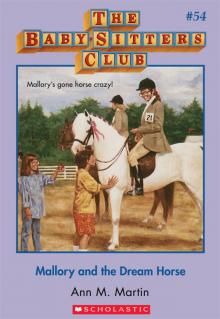 Mallory and the Dream Horse
Mallory and the Dream Horse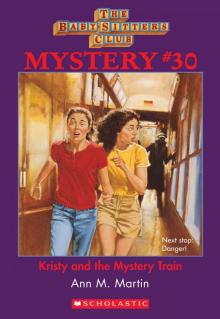 Kristy and the Mystery Train
Kristy and the Mystery Train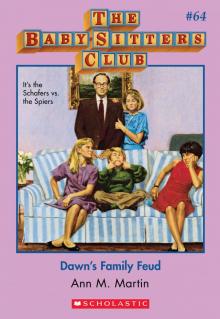 Dawn's Family Feud
Dawn's Family Feud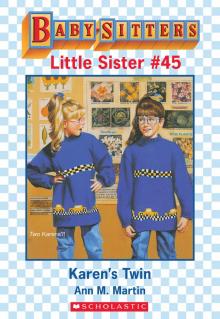 Karen's Twin
Karen's Twin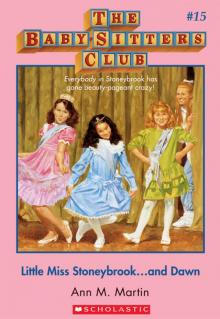 Little Miss Stoneybrook... And Dawn
Little Miss Stoneybrook... And Dawn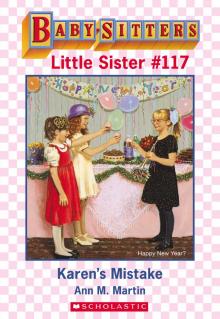 Karen's Mistake
Karen's Mistake Karen's Movie Star
Karen's Movie Star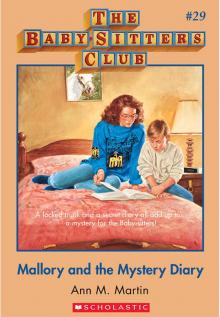 Mallory and the Mystery Diary
Mallory and the Mystery Diary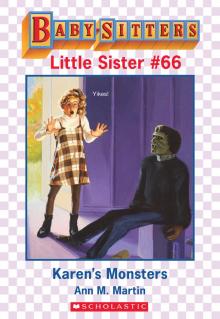 Karen's Monsters
Karen's Monsters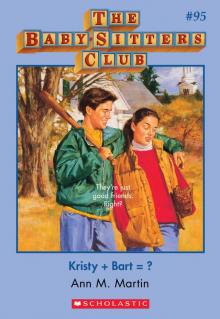 Kristy + Bart = ?
Kristy + Bart = ?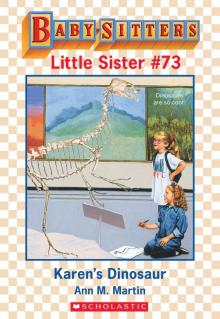 Karen's Dinosaur
Karen's Dinosaur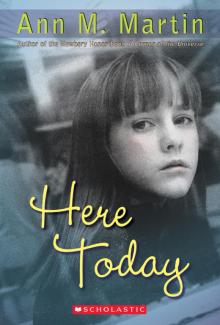 Here Today
Here Today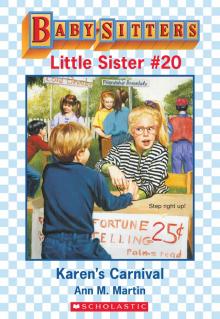 Karen's Carnival
Karen's Carnival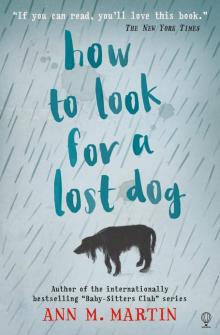 How to Look for a Lost Dog
How to Look for a Lost Dog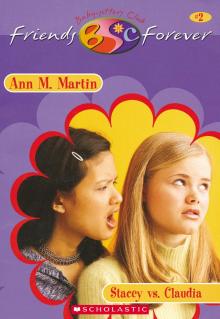 Stacey vs. Claudia
Stacey vs. Claudia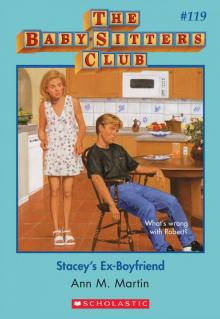 Stacey's Ex-Boyfriend
Stacey's Ex-Boyfriend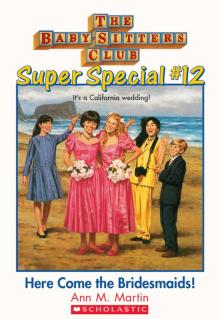 Here Come the Bridesmaids!
Here Come the Bridesmaids! Graduation Day
Graduation Day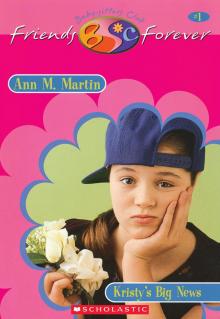 Kristy's Big News
Kristy's Big News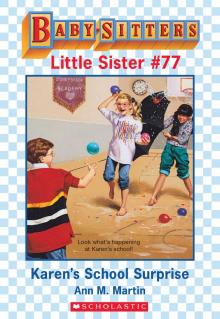 Karen's School Surprise
Karen's School Surprise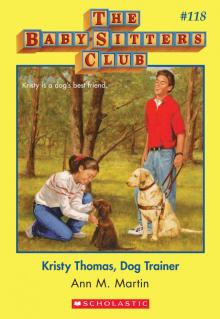 Kristy Thomas, Dog Trainer
Kristy Thomas, Dog Trainer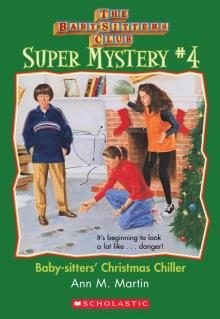 Baby-Sitters' Christmas Chiller
Baby-Sitters' Christmas Chiller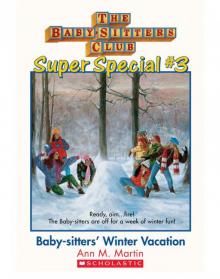 Baby-Sitters' Winter Vacation
Baby-Sitters' Winter Vacation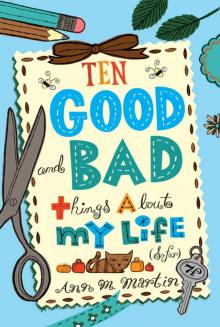 Ten Good and Bad Things About My Life
Ten Good and Bad Things About My Life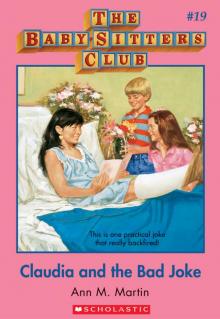 Claudia and the Bad Joke
Claudia and the Bad Joke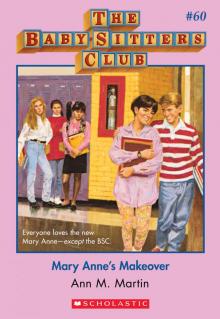 Mary Anne's Makeover
Mary Anne's Makeover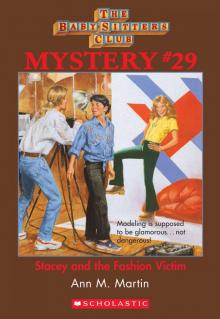 Stacey and the Fashion Victim
Stacey and the Fashion Victim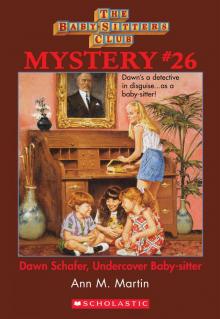 Dawn Schafer, Undercover Baby-Sitter
Dawn Schafer, Undercover Baby-Sitter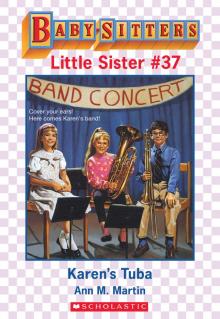 Karen's Tuba
Karen's Tuba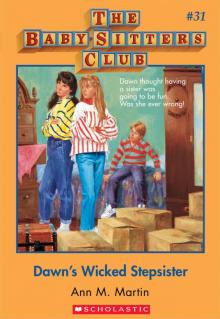 Dawn's Wicked Stepsister
Dawn's Wicked Stepsister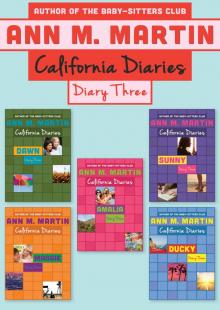 Diary Three: Dawn, Sunny, Maggie, Amalia, and Ducky
Diary Three: Dawn, Sunny, Maggie, Amalia, and Ducky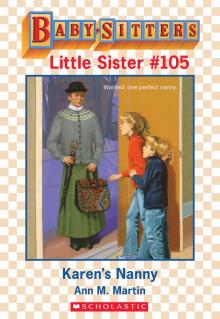 Karen's Nanny
Karen's Nanny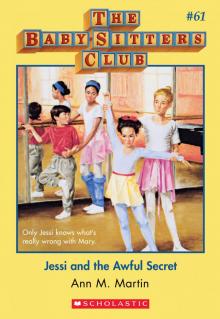 Jessi and the Awful Secret
Jessi and the Awful Secret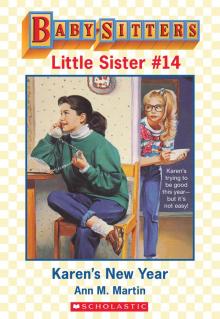 Karen's New Year
Karen's New Year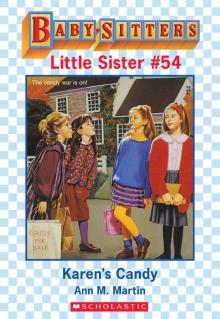 Karen's Candy
Karen's Candy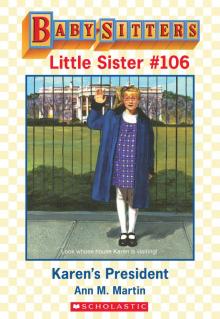 Karen's President
Karen's President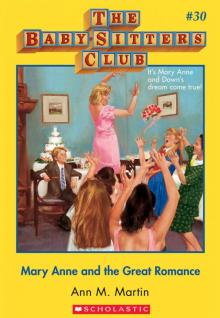 Mary Anne and the Great Romance
Mary Anne and the Great Romance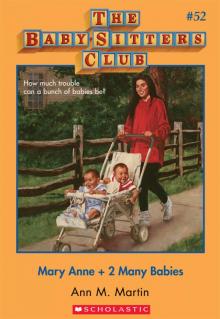 Mary Anne + 2 Many Babies
Mary Anne + 2 Many Babies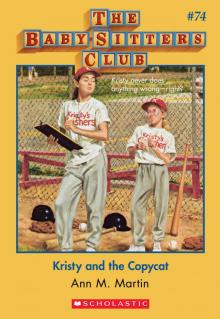 Kristy and the Copycat
Kristy and the Copycat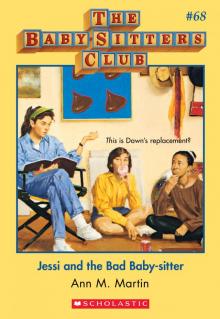 Jessi and the Bad Baby-Sitter
Jessi and the Bad Baby-Sitter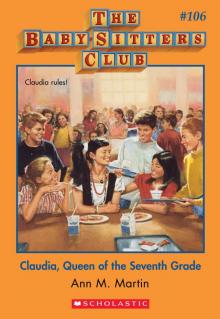 Claudia, Queen of the Seventh Grade
Claudia, Queen of the Seventh Grade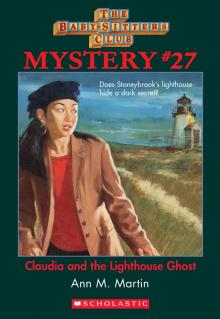 Claudia and the Lighthouse Ghost
Claudia and the Lighthouse Ghost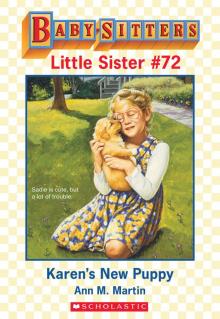 Karen's New Puppy
Karen's New Puppy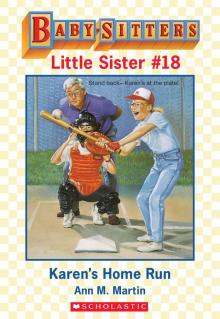 Karen's Home Run
Karen's Home Run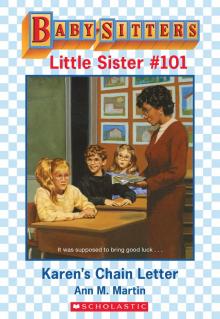 Karen's Chain Letter
Karen's Chain Letter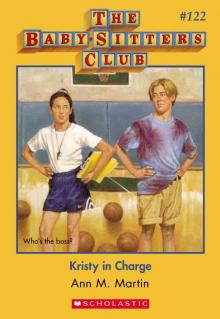 Kristy in Charge
Kristy in Charge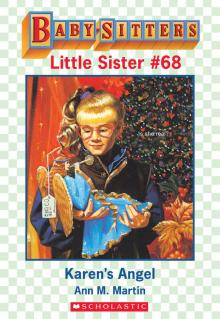 Karen's Angel
Karen's Angel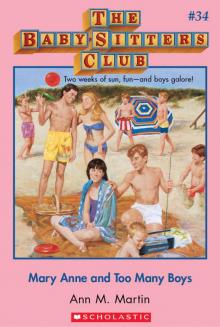 Mary Anne and Too Many Boys
Mary Anne and Too Many Boys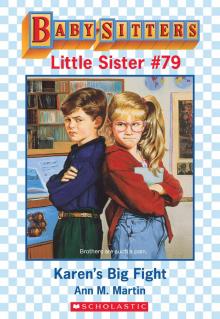 Karen's Big Fight
Karen's Big Fight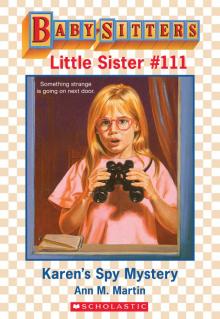 Karen's Spy Mystery
Karen's Spy Mystery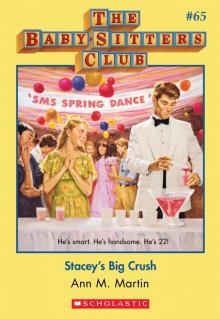 Stacey's Big Crush
Stacey's Big Crush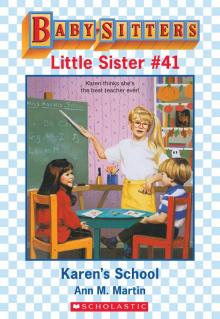 Karen's School
Karen's School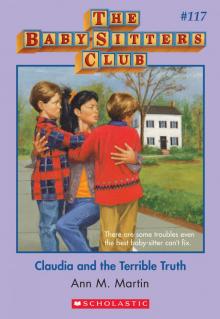 Claudia and the Terrible Truth
Claudia and the Terrible Truth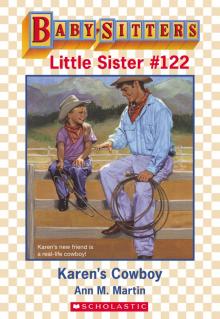 Karen's Cowboy
Karen's Cowboy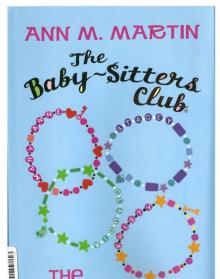 The Summer Before
The Summer Before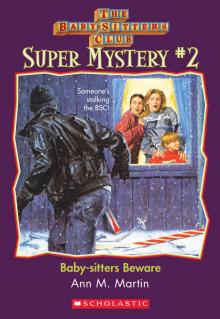 Beware, Dawn!
Beware, Dawn!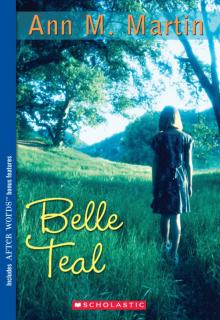 Belle Teale
Belle Teale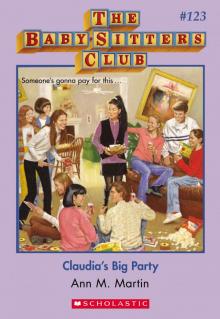 Claudia's Big Party
Claudia's Big Party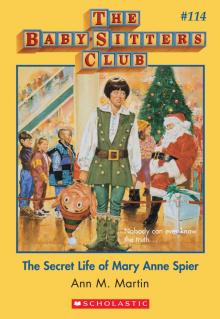 The Secret Life of Mary Anne Spier
The Secret Life of Mary Anne Spier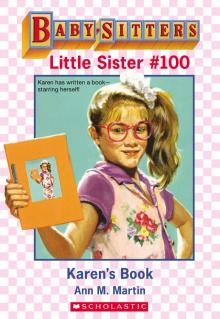 Karen's Book
Karen's Book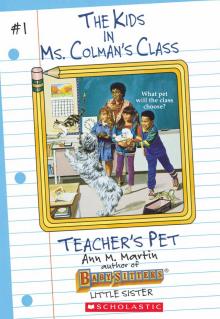 Teacher's Pet
Teacher's Pet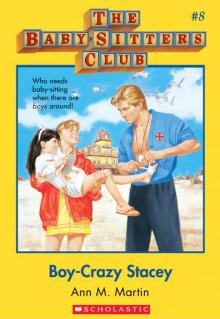 Boy-Crazy Stacey
Boy-Crazy Stacey Claudia and the Disaster Date
Claudia and the Disaster Date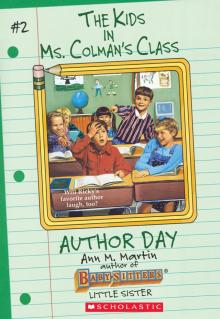 Author Day
Author Day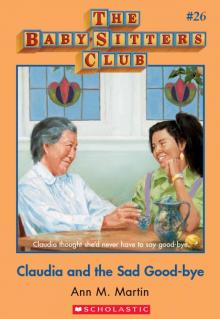 Claudia and the Sad Good-Bye
Claudia and the Sad Good-Bye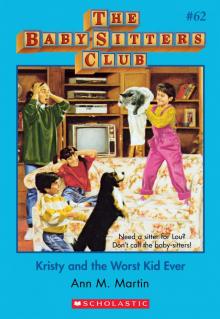 Kristy and the Worst Kid Ever
Kristy and the Worst Kid Ever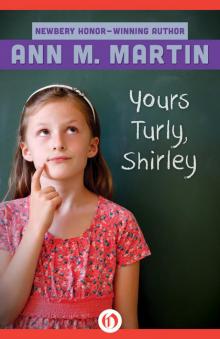 Yours Turly, Shirley
Yours Turly, Shirley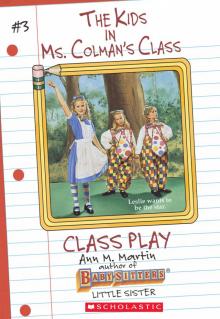 Class Play
Class Play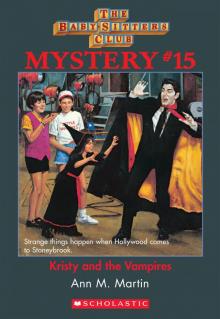 Kristy and the Vampires
Kristy and the Vampires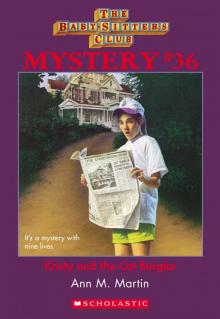 Kristy and the Cat Burglar
Kristy and the Cat Burglar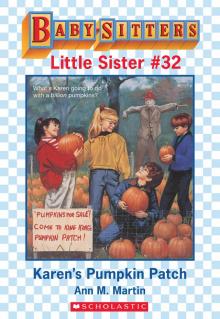 Karen's Pumpkin Patch
Karen's Pumpkin Patch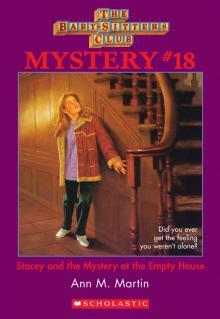 Stacey and the Mystery at the Empty House
Stacey and the Mystery at the Empty House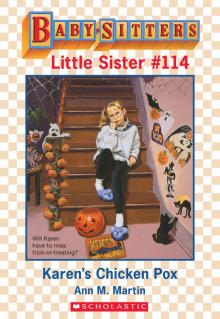 Karen's Chicken Pox
Karen's Chicken Pox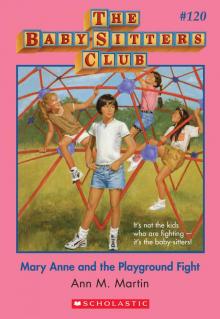 Mary Anne and the Playground Fight
Mary Anne and the Playground Fight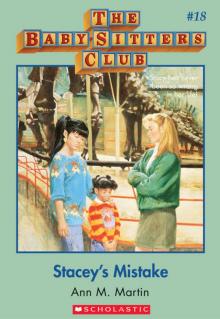 Stacey's Mistake
Stacey's Mistake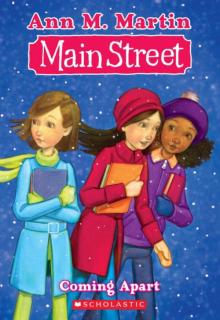 Coming Apart
Coming Apart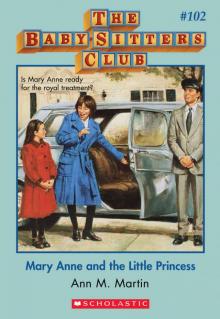 Mary Anne and the Little Princess
Mary Anne and the Little Princess Karen, Hannie and Nancy: The Three Musketeers
Karen, Hannie and Nancy: The Three Musketeers 'Tis the Season
'Tis the Season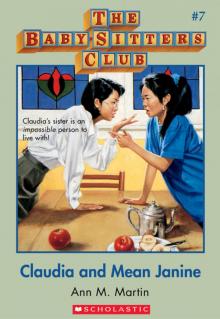 Claudia and Mean Janine
Claudia and Mean Janine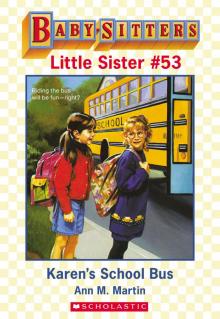 Karen's School Bus
Karen's School Bus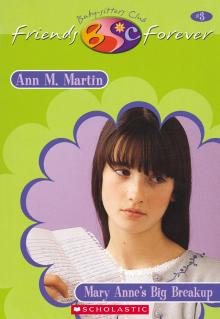 Mary Anne's Big Breakup
Mary Anne's Big Breakup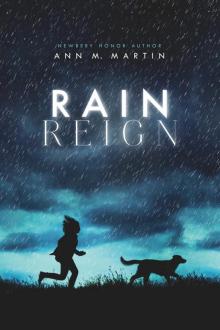 Rain Reign
Rain Reign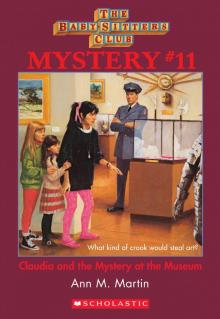 Claudia and the Mystery at the Museum
Claudia and the Mystery at the Museum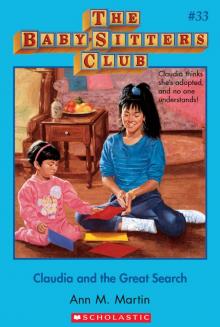 Claudia and the Great Search
Claudia and the Great Search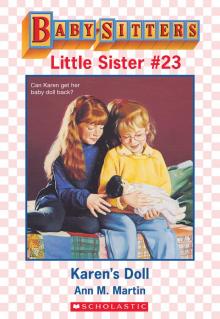 Karen's Doll
Karen's Doll Shannon's Story
Shannon's Story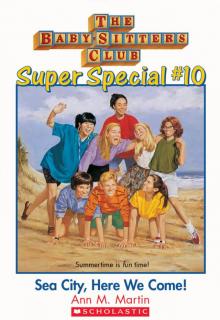 Sea City, Here We Come!
Sea City, Here We Come!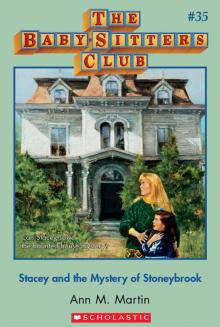 Stacey and the Mystery of Stoneybrook
Stacey and the Mystery of Stoneybrook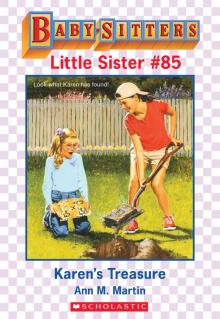 Karen's Treasure
Karen's Treasure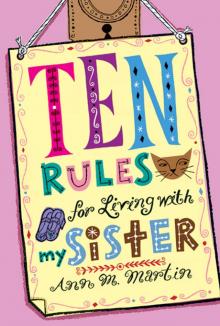 Ten Rules for Living With My Sister
Ten Rules for Living With My Sister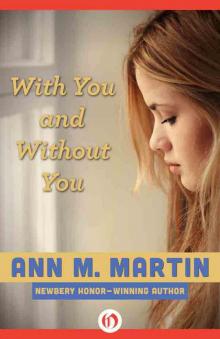 With You and Without You
With You and Without You Baby-Sitters' Island Adventure
Baby-Sitters' Island Adventure Karen's Fishing Trip
Karen's Fishing Trip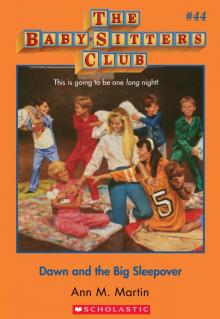 Dawn and the Big Sleepover
Dawn and the Big Sleepover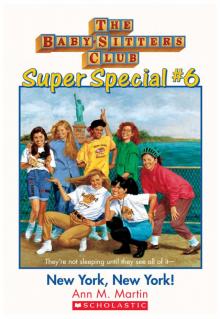 New York, New York!
New York, New York!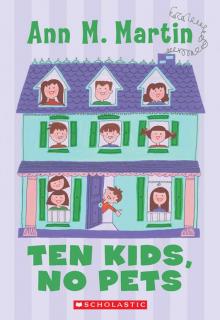 Ten Kids, No Pets
Ten Kids, No Pets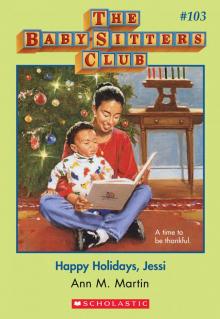 Happy Holidays, Jessi
Happy Holidays, Jessi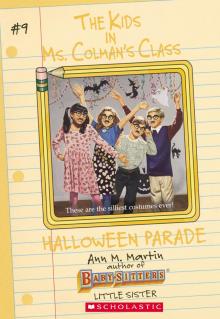 Halloween Parade
Halloween Parade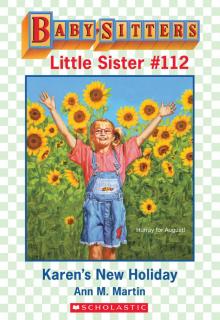 Karen's New Holiday
Karen's New Holiday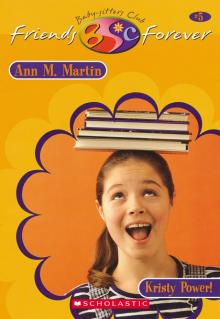 Kristy Power!
Kristy Power!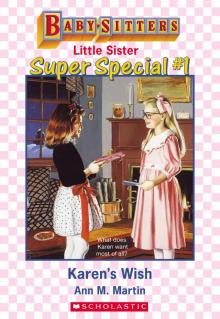 Karen's Wish
Karen's Wish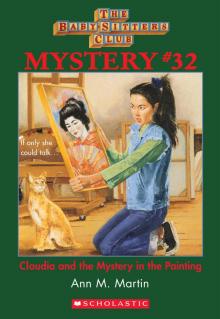 Claudia and the Mystery in the Painting
Claudia and the Mystery in the Painting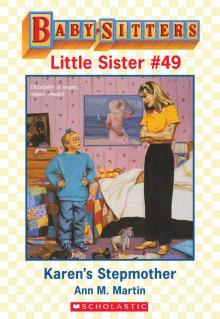 Karen's Stepmother
Karen's Stepmother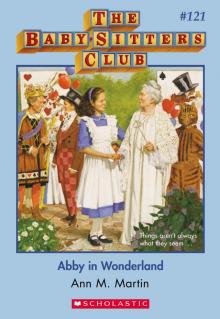 Abby in Wonderland
Abby in Wonderland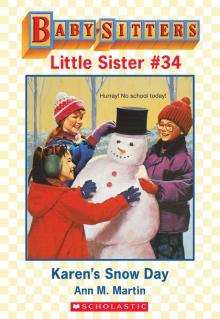 Karen's Snow Day
Karen's Snow Day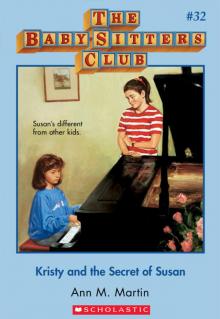 Kristy and the Secret of Susan
Kristy and the Secret of Susan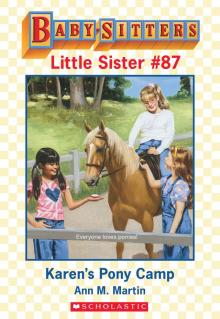 Karen's Pony Camp
Karen's Pony Camp Karen's School Trip
Karen's School Trip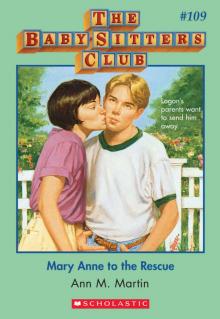 Mary Anne to the Rescue
Mary Anne to the Rescue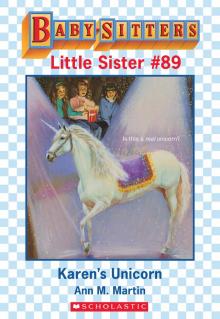 Karen's Unicorn
Karen's Unicorn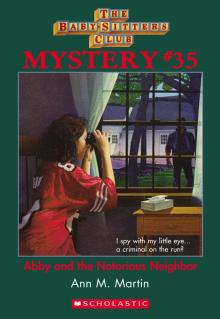 Abby and the Notorious Neighbor
Abby and the Notorious Neighbor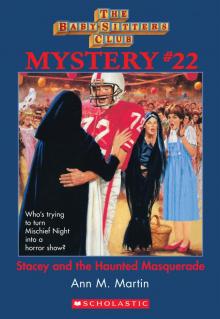 Stacey and the Haunted Masquerade
Stacey and the Haunted Masquerade Claudia Gets Her Guy
Claudia Gets Her Guy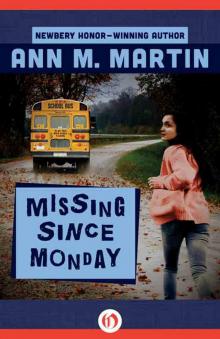 Missing Since Monday
Missing Since Monday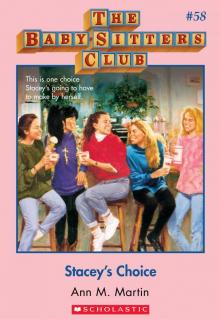 Stacey's Choice
Stacey's Choice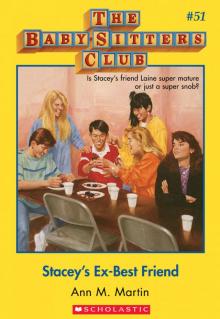 Stacey's Ex-Best Friend
Stacey's Ex-Best Friend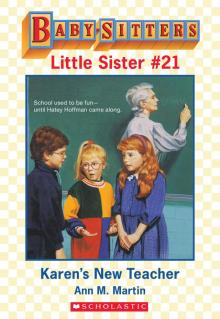 Karen's New Teacher
Karen's New Teacher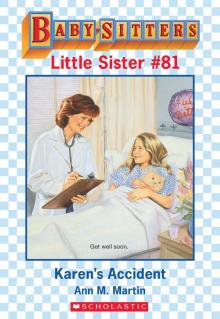 Karen's Accident
Karen's Accident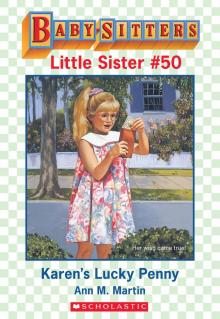 Karen's Lucky Penny
Karen's Lucky Penny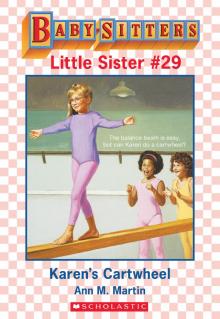 Karen's Cartwheel
Karen's Cartwheel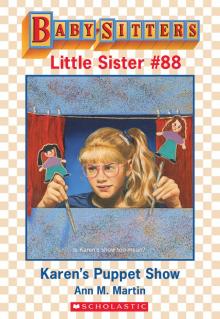 Karen's Puppet Show
Karen's Puppet Show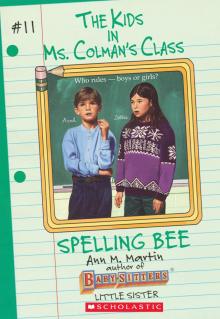 Spelling Bee
Spelling Bee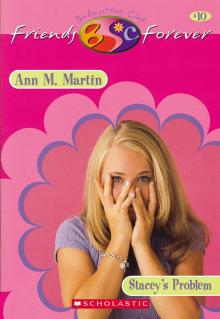 Stacey's Problem
Stacey's Problem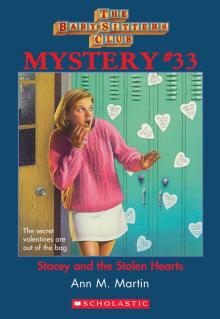 Stacey and the Stolen Hearts
Stacey and the Stolen Hearts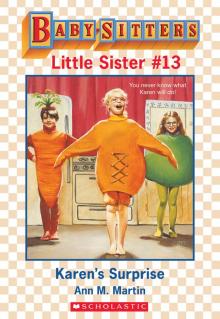 Karen's Surprise
Karen's Surprise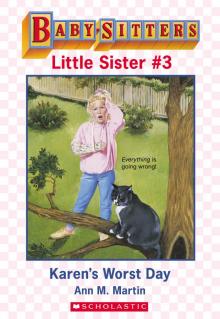 Karen's Worst Day
Karen's Worst Day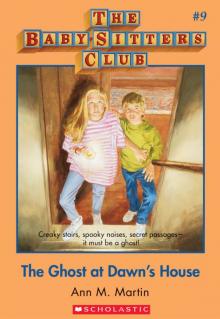 The Ghost at Dawn's House
The Ghost at Dawn's House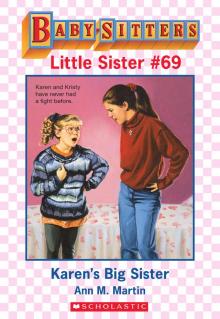 Karen's Big Sister
Karen's Big Sister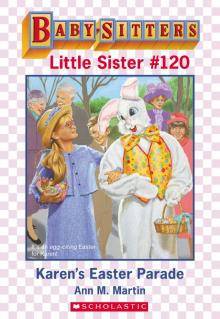 Karen's Easter Parade
Karen's Easter Parade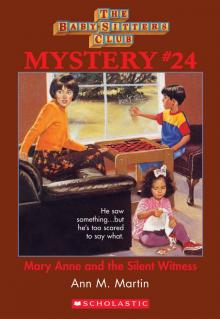 Mary Anne and the Silent Witness
Mary Anne and the Silent Witness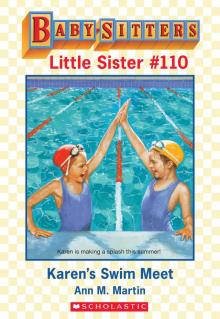 Karen's Swim Meet
Karen's Swim Meet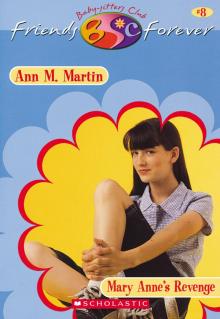 Mary Anne's Revenge
Mary Anne's Revenge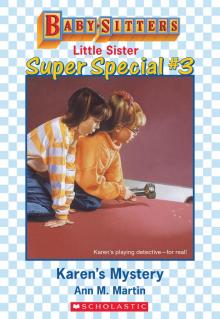 Karen's Mystery
Karen's Mystery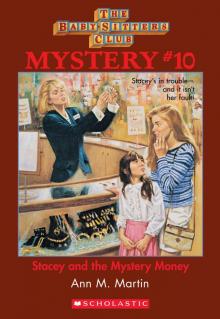 Stacey and the Mystery Money
Stacey and the Mystery Money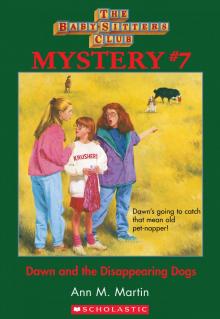 Dawn and the Disappearing Dogs
Dawn and the Disappearing Dogs Karen's Christmas Tree
Karen's Christmas Tree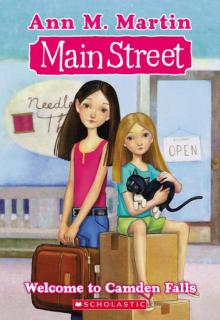 Welcome to Camden Falls
Welcome to Camden Falls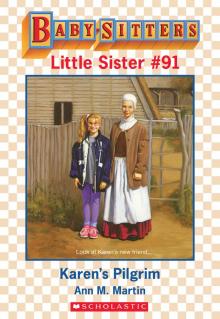 Karen's Pilgrim
Karen's Pilgrim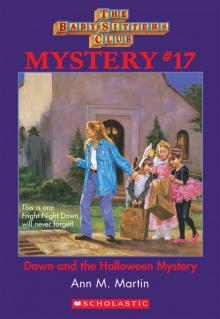 Dawn and the Halloween Mystery
Dawn and the Halloween Mystery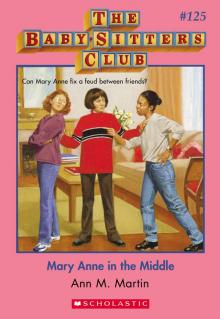 Mary Anne in the Middle
Mary Anne in the Middle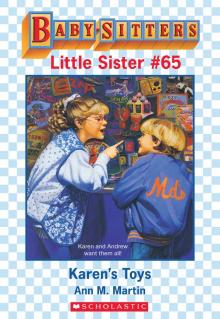 Karen's Toys
Karen's Toys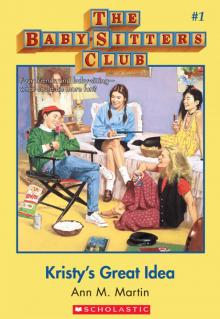 Kristy's Great Idea
Kristy's Great Idea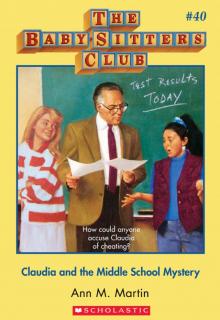 Claudia and the Middle School Mystery
Claudia and the Middle School Mystery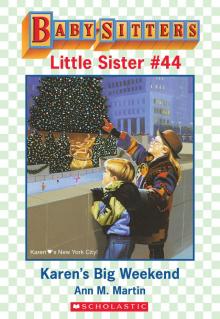 Karen's Big Weekend
Karen's Big Weekend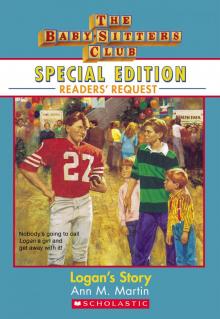 Logan's Story
Logan's Story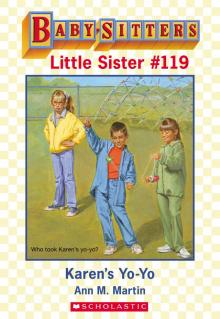 Karen's Yo-Yo
Karen's Yo-Yo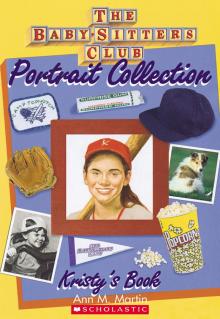 Kristy's Book
Kristy's Book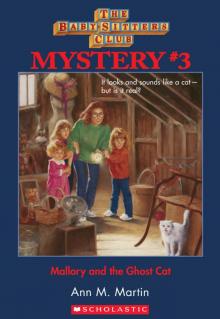 Mallory and the Ghost Cat
Mallory and the Ghost Cat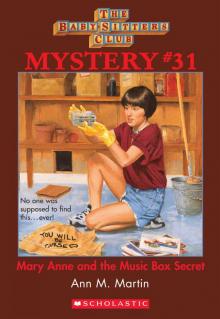 Mary Anne and the Music
Mary Anne and the Music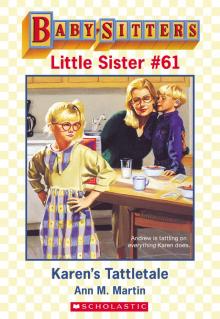 Karen's Tattletale
Karen's Tattletale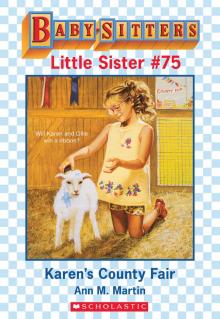 Karen's County Fair
Karen's County Fair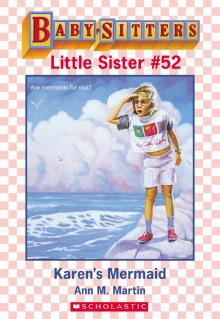 Karen's Mermaid
Karen's Mermaid Snowbound
Snowbound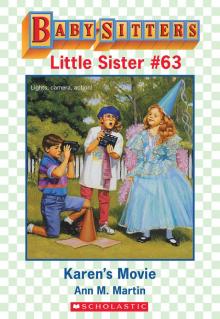 Karen's Movie
Karen's Movie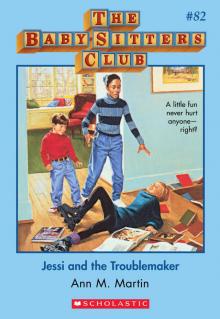 Jessi and the Troublemaker
Jessi and the Troublemaker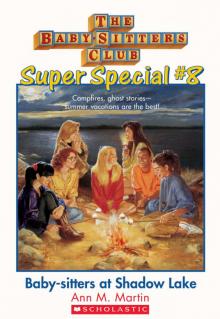 Baby-Sitters at Shadow Lake
Baby-Sitters at Shadow Lake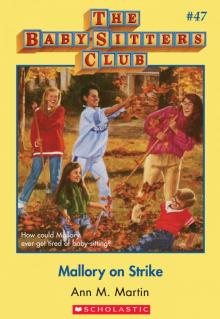 Mallory on Strike
Mallory on Strike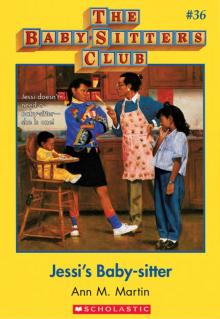 Jessi's Baby-Sitter
Jessi's Baby-Sitter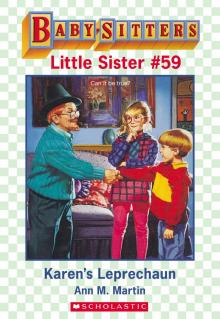 Karen's Leprechaun
Karen's Leprechaun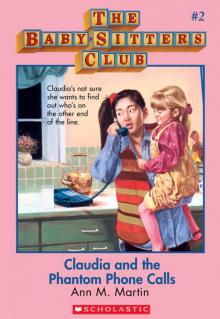 Claudia and the Phantom Phone Calls
Claudia and the Phantom Phone Calls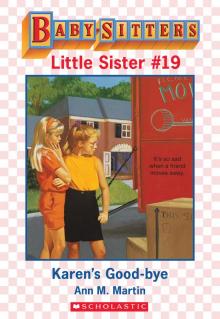 Karen's Good-Bye
Karen's Good-Bye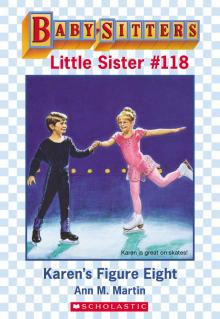 Karen's Figure Eight
Karen's Figure Eight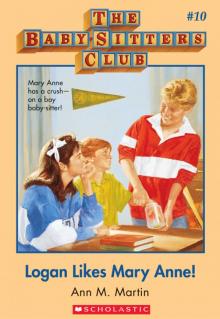 Logan Likes Mary Anne!
Logan Likes Mary Anne!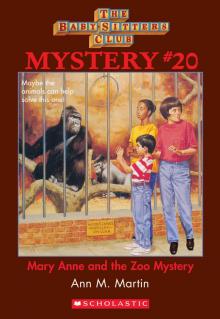 Mary Anne and the Zoo Mystery
Mary Anne and the Zoo Mystery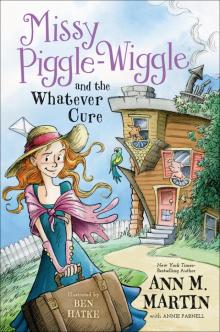 Missy Piggle-Wiggle and the Whatever Cure
Missy Piggle-Wiggle and the Whatever Cure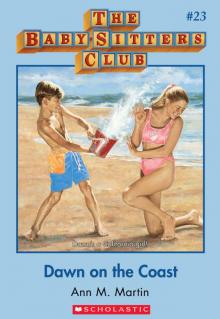 Dawn on the Coast
Dawn on the Coast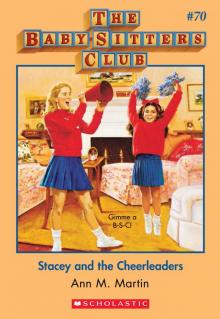 Stacey and the Cheerleaders
Stacey and the Cheerleaders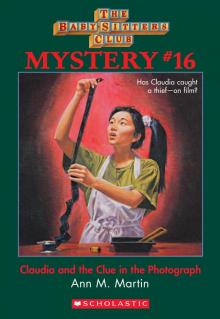 Claudia and the Clue in the Photograph
Claudia and the Clue in the Photograph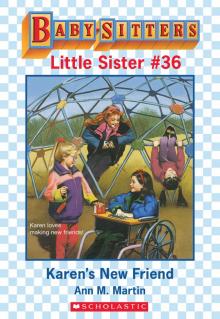 Karen's New Friend
Karen's New Friend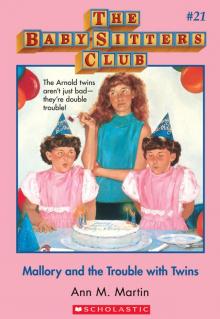 Mallory and the Trouble With Twins
Mallory and the Trouble With Twins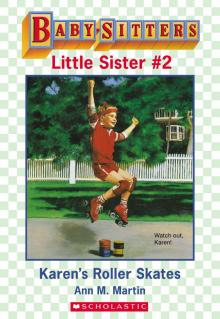 Karen's Roller Skates
Karen's Roller Skates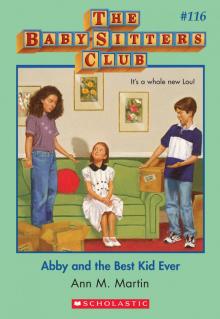 Abby and the Best Kid Ever
Abby and the Best Kid Ever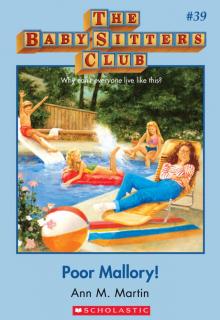 Poor Mallory!
Poor Mallory!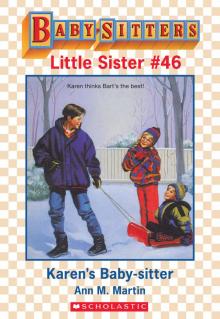 Karen's Witch
Karen's Witch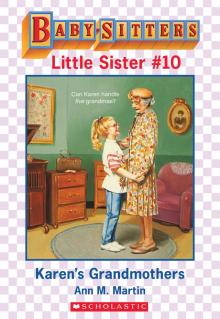 Karen's Grandmothers
Karen's Grandmothers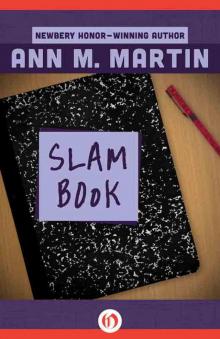 Slam Book
Slam Book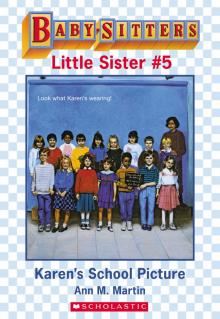 Karen's School Picture
Karen's School Picture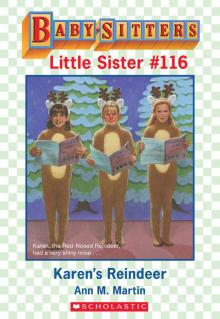 Karen's Reindeer
Karen's Reindeer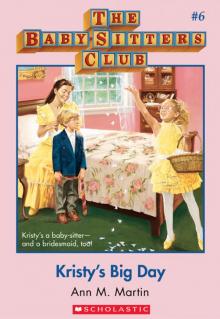 Kristy's Big Day
Kristy's Big Day The Long Way Home
The Long Way Home Karen's Sleigh Ride
Karen's Sleigh Ride On Christmas Eve
On Christmas Eve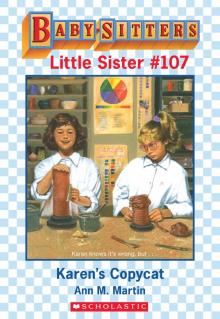 Karen's Copycat
Karen's Copycat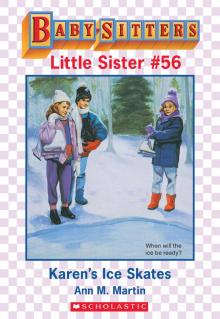 Karen's Ice Skates
Karen's Ice Skates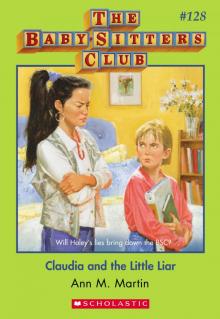 Claudia and the Little Liar
Claudia and the Little Liar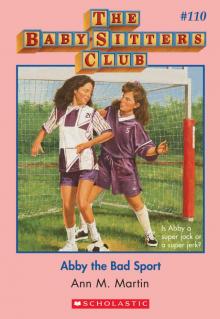 Abby the Bad Sport
Abby the Bad Sport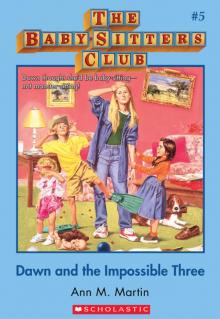 The Baby-Sitters Club #5: Dawn and the Impossible Three
The Baby-Sitters Club #5: Dawn and the Impossible Three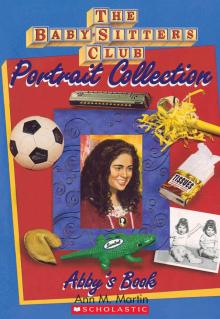 Abby's Book
Abby's Book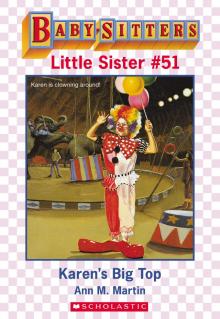 Karen's Big Top
Karen's Big Top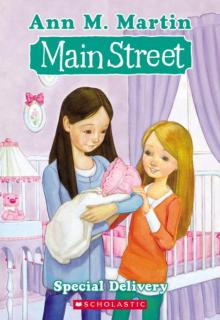 Main Street #8: Special Delivery
Main Street #8: Special Delivery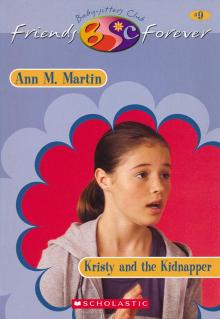 Kristy and the Kidnapper
Kristy and the Kidnapper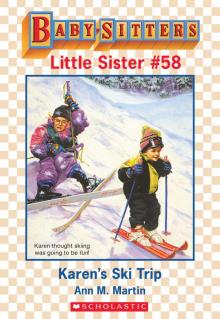 Karen's Ski Trip
Karen's Ski Trip Karen's Hurricane
Karen's Hurricane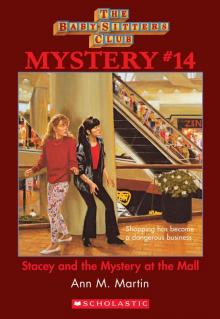 Stacey and the Mystery at the Mall
Stacey and the Mystery at the Mall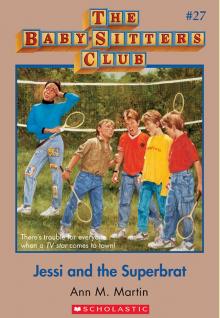 Jessi and the Superbrat
Jessi and the Superbrat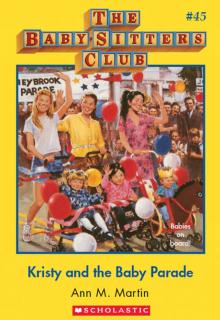 Kristy and the Baby Parade
Kristy and the Baby Parade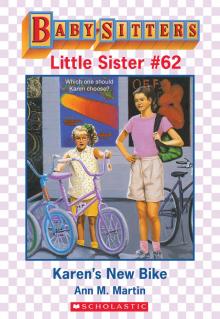 Karen's New Bike
Karen's New Bike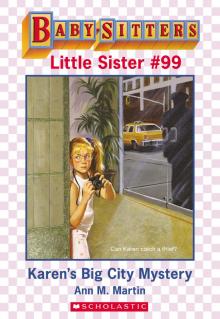 Karen's Big City Mystery
Karen's Big City Mystery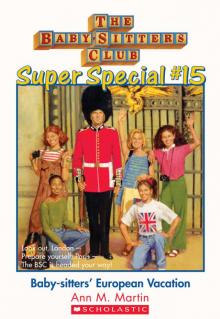 Baby-Sitters' European Vacation
Baby-Sitters' European Vacation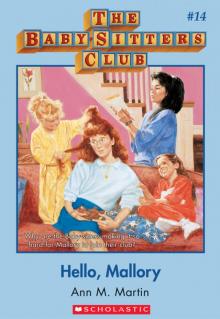 Hello, Mallory
Hello, Mallory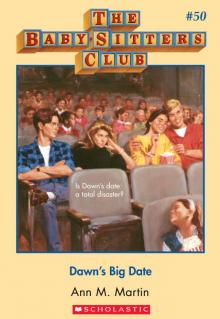 Dawn's Big Date
Dawn's Big Date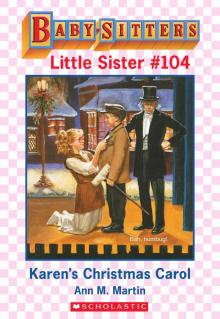 Karen's Christmas Carol
Karen's Christmas Carol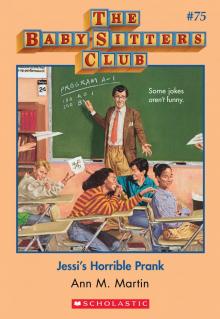 Jessi's Horrible Prank
Jessi's Horrible Prank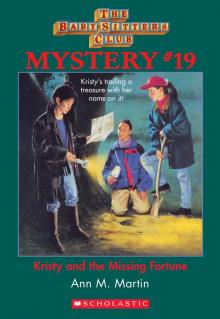 Kristy and the Missing Fortune
Kristy and the Missing Fortune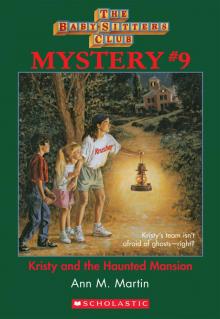 Kristy and the Haunted Mansion
Kristy and the Haunted Mansion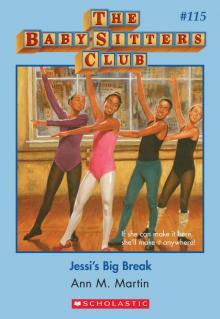 Jessi's Big Break
Jessi's Big Break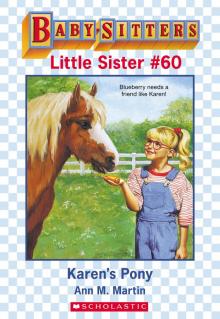 Karen's Pony
Karen's Pony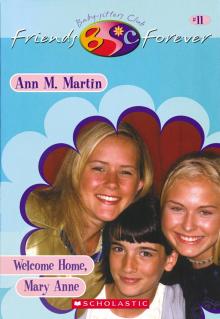 Welcome Home, Mary Anne
Welcome Home, Mary Anne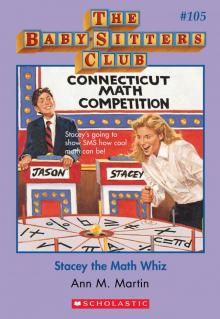 Stacey the Math Whiz
Stacey the Math Whiz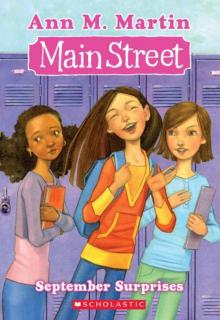 September Surprises
September Surprises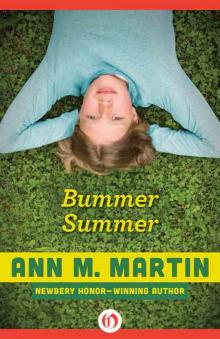 Bummer Summer
Bummer Summer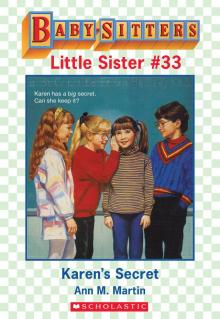 Karen's Secret
Karen's Secret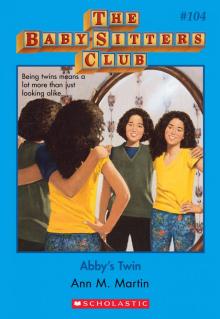 Abby's Twin
Abby's Twin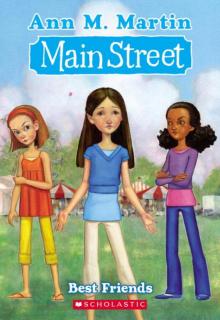 Main Street #4: Best Friends
Main Street #4: Best Friends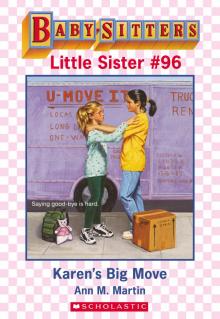 Karen's Big Move
Karen's Big Move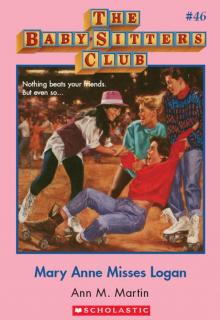 Mary Anne Misses Logan
Mary Anne Misses Logan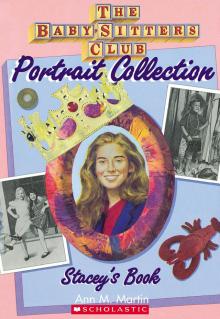 Stacey's Book
Stacey's Book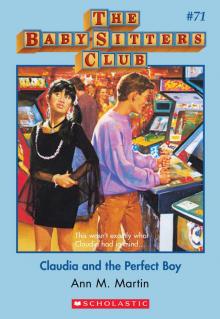 Claudia and the Perfect Boy
Claudia and the Perfect Boy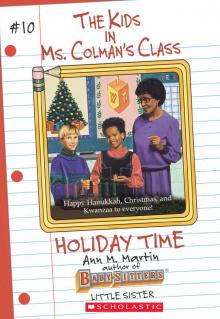 Holiday Time
Holiday Time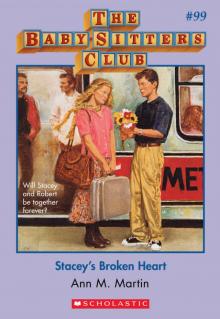 Stacey's Broken Heart
Stacey's Broken Heart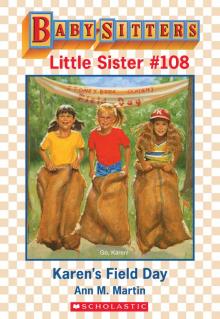 Karen's Field Day
Karen's Field Day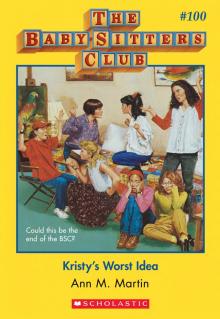 Kristy's Worst Idea
Kristy's Worst Idea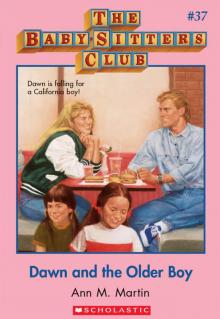 Dawn and the Older Boy
Dawn and the Older Boy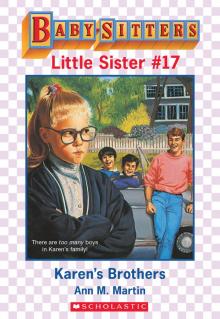 Karen's Brothers
Karen's Brothers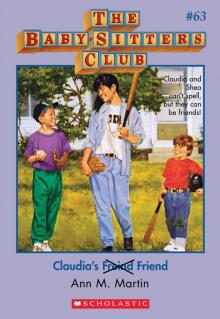 Claudia's Friend
Claudia's Friend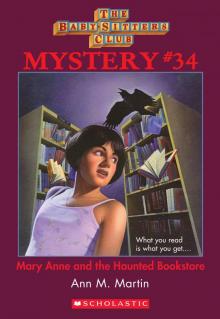 Mary Anne and the Haunted Bookstore
Mary Anne and the Haunted Bookstore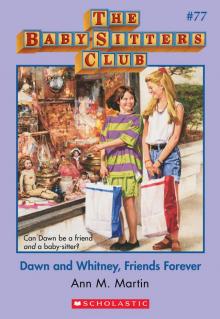 Dawn and Whitney, Friends Forever
Dawn and Whitney, Friends Forever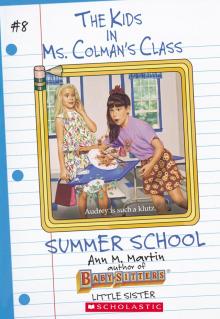 Summer School
Summer School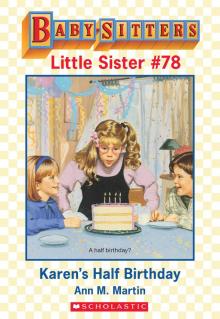 Karen's Birthday
Karen's Birthday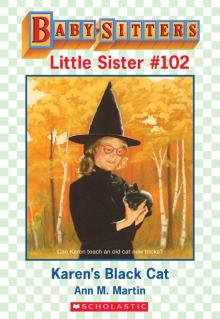 Karen's Black Cat
Karen's Black Cat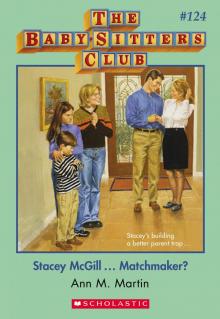 Stacey McGill... Matchmaker?
Stacey McGill... Matchmaker?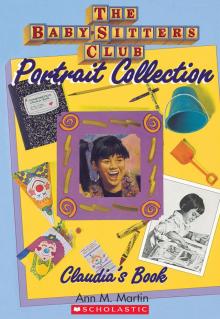 Claudia's Book
Claudia's Book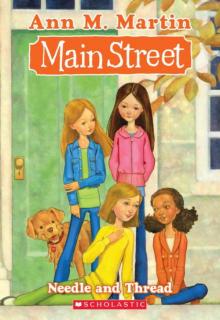 Main Street #2: Needle and Thread
Main Street #2: Needle and Thread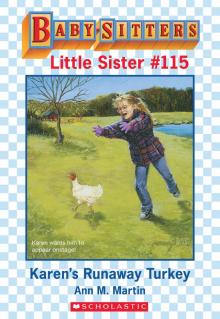 Karen's Runaway Turkey
Karen's Runaway Turkey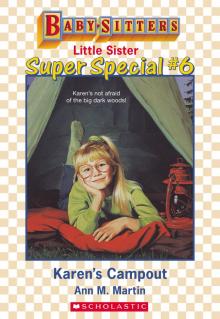 Karen's Campout
Karen's Campout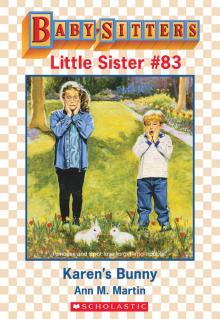 Karen's Bunny
Karen's Bunny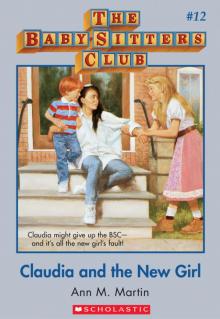 Claudia and the New Girl
Claudia and the New Girl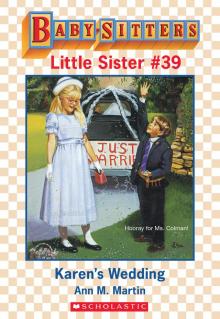 Karen's Wedding
Karen's Wedding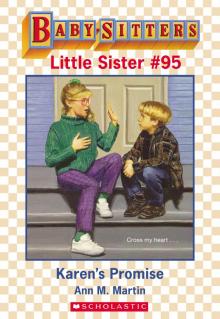 Karen's Promise
Karen's Promise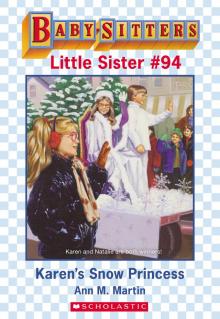 Karen's Snow Princess
Karen's Snow Princess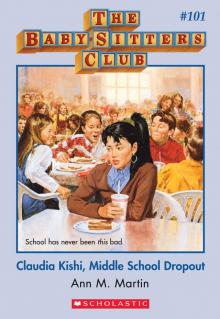 Claudia Kishi, Middle School Dropout
Claudia Kishi, Middle School Dropout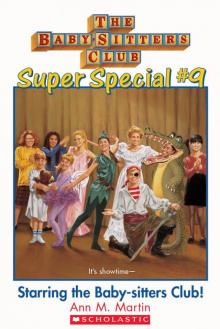 Starring the Baby-Sitters Club!
Starring the Baby-Sitters Club!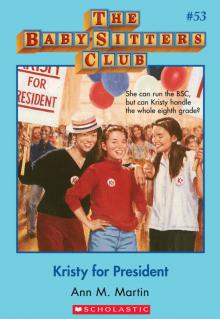 Kristy for President
Kristy for President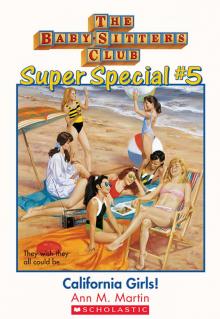 California Girls!
California Girls!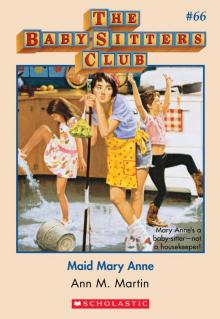 Maid Mary Anne
Maid Mary Anne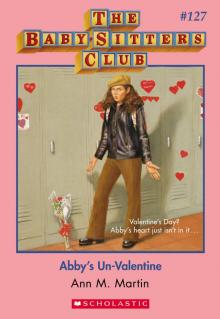 Abby's Un-Valentine
Abby's Un-Valentine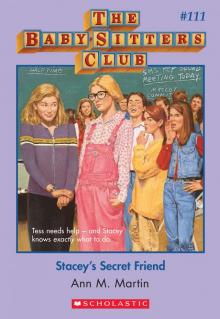 Stacey's Secret Friend
Stacey's Secret Friend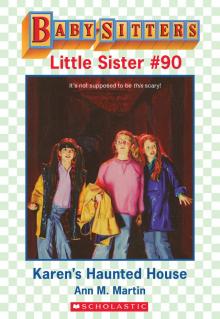 Karen's Haunted House
Karen's Haunted House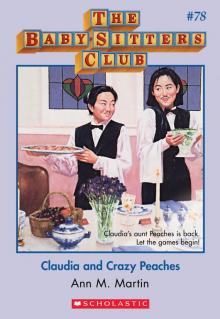 Claudia and Crazy Peaches
Claudia and Crazy Peaches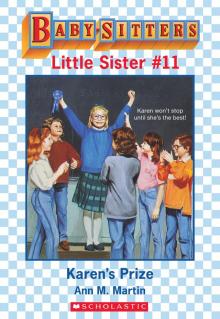 Karen's Prize
Karen's Prize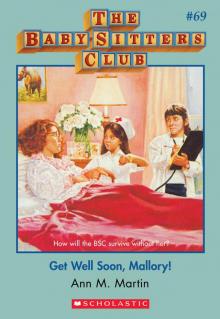 Get Well Soon, Mallory!
Get Well Soon, Mallory!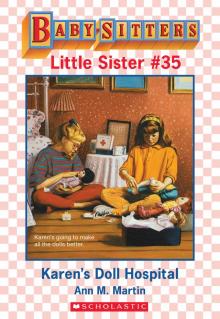 Karen's Doll Hospital
Karen's Doll Hospital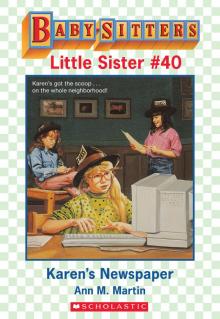 Karen's Newspaper
Karen's Newspaper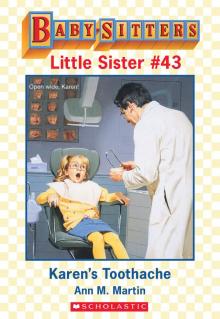 Karen's Toothache
Karen's Toothache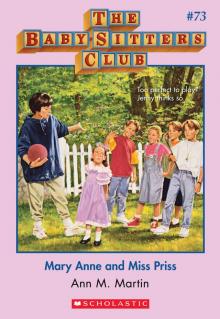 Mary Anne and Miss Priss
Mary Anne and Miss Priss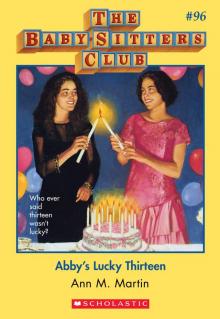 Abby's Lucky Thirteen
Abby's Lucky Thirteen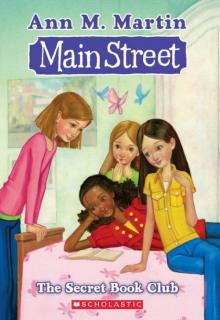 The Secret Book Club
The Secret Book Club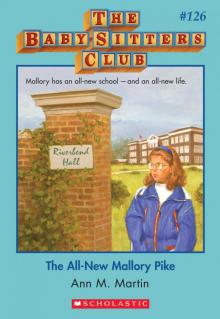 The All-New Mallory Pike
The All-New Mallory Pike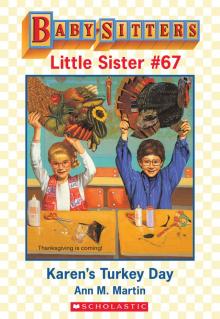 Karen's Turkey Day
Karen's Turkey Day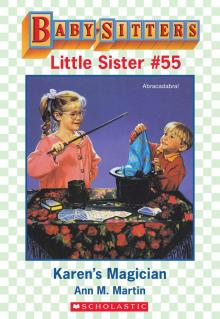 Karen's Magician
Karen's Magician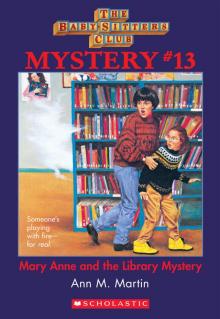 Mary Anne and the Library Mystery
Mary Anne and the Library Mystery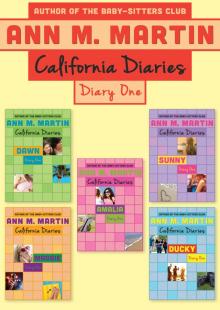 Diary One: Dawn, Sunny, Maggie, Amalia, and Ducky
Diary One: Dawn, Sunny, Maggie, Amalia, and Ducky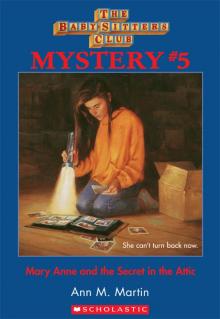 Mary Anne and the Secret in the Attic
Mary Anne and the Secret in the Attic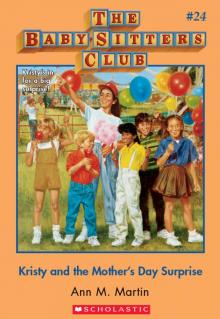 Kristy and the Mother's Day Surprise
Kristy and the Mother's Day Surprise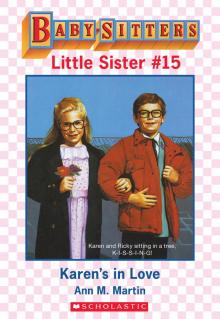 Karen's in Love
Karen's in Love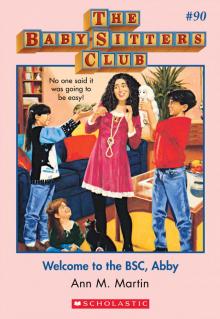 Welcome to the BSC, Abby
Welcome to the BSC, Abby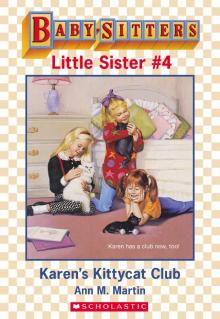 Karen's Kittycat Club
Karen's Kittycat Club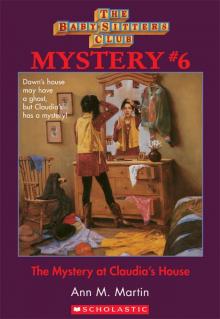 The Mystery at Claudia's House
The Mystery at Claudia's House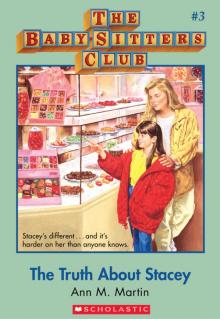 The Truth About Stacey
The Truth About Stacey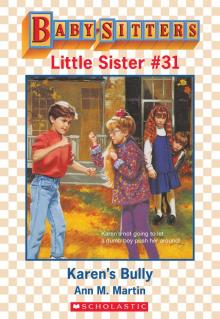 Karen's Bully
Karen's Bully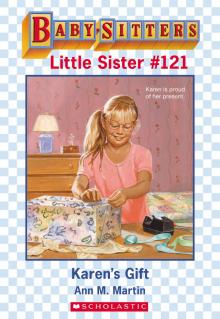 Karen's Gift
Karen's Gift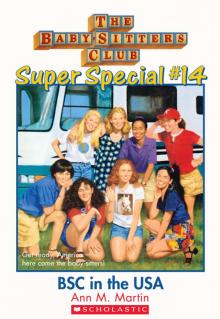 BSC in the USA
BSC in the USA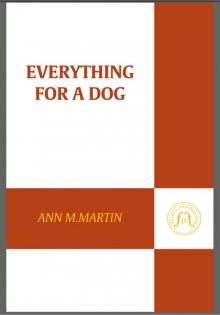 Everything for a Dog
Everything for a Dog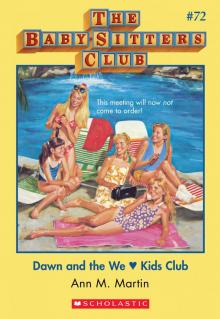 Dawn and the We Love Kids Club
Dawn and the We Love Kids Club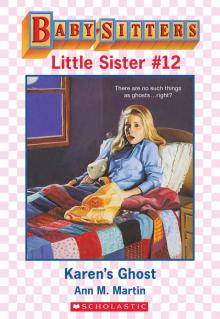 Karen's Ghost
Karen's Ghost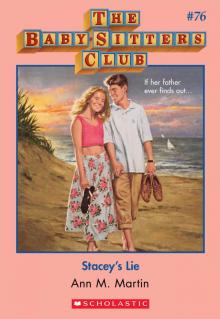 Stacey's Lie
Stacey's Lie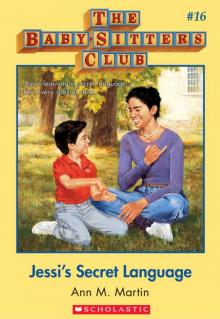 Jessi's Secret Language
Jessi's Secret Language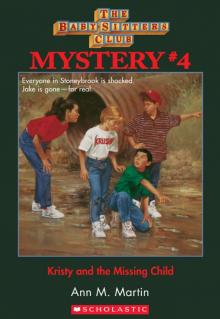 Kristy and the Missing Child
Kristy and the Missing Child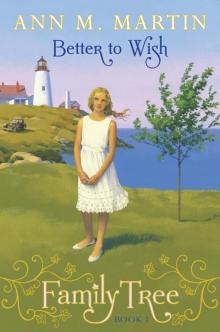 Better to Wish
Better to Wish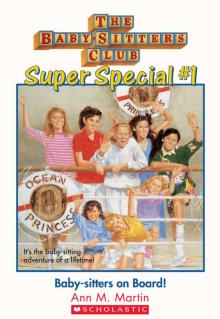 Baby-Sitters on Board!
Baby-Sitters on Board!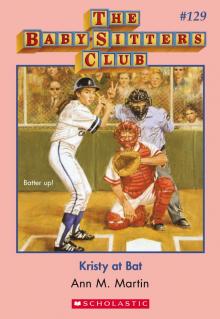 Kristy at Bat
Kristy at Bat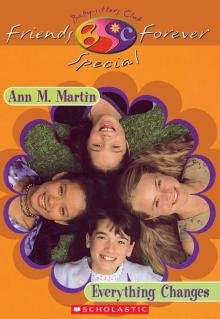 Everything Changes
Everything Changes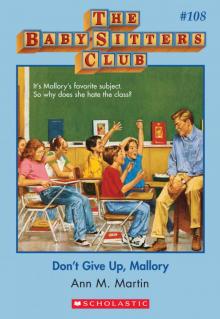 Don't Give Up, Mallory
Don't Give Up, Mallory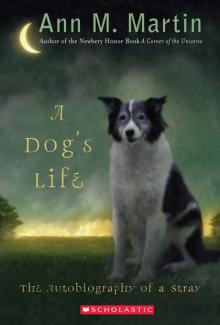 A Dog's Life: The Autobiography of a Stray
A Dog's Life: The Autobiography of a Stray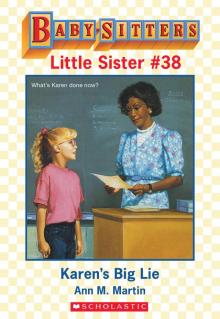 Karen's Big Lie
Karen's Big Lie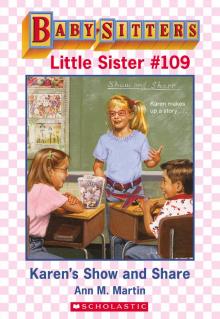 Karen's Show and Share
Karen's Show and Share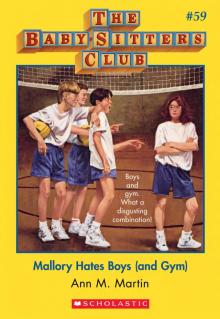 Mallory Hates Boys (and Gym)
Mallory Hates Boys (and Gym)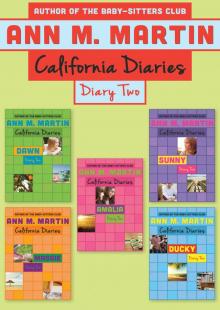 Diary Two: Dawn, Sunny, Maggie, Amalia, and Ducky
Diary Two: Dawn, Sunny, Maggie, Amalia, and Ducky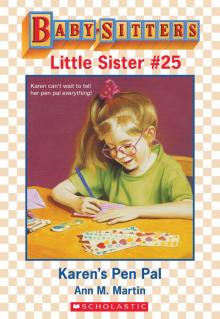 Karen's Pen Pal
Karen's Pen Pal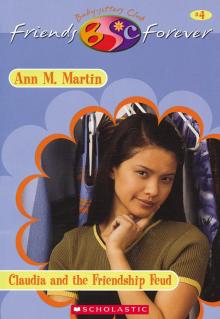 Claudia and the Friendship Feud
Claudia and the Friendship Feud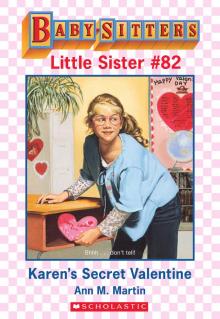 Karen's Secret Valentine
Karen's Secret Valentine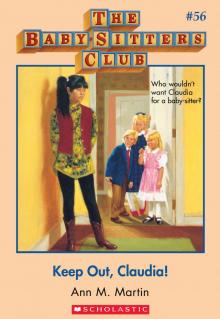 Keep Out, Claudia!
Keep Out, Claudia!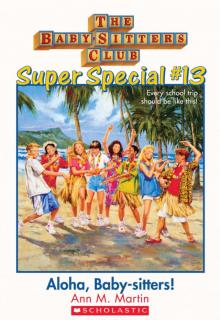 Aloha, Baby-Sitters!
Aloha, Baby-Sitters!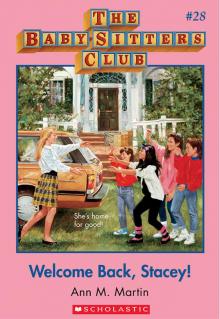 Welcome Back, Stacey
Welcome Back, Stacey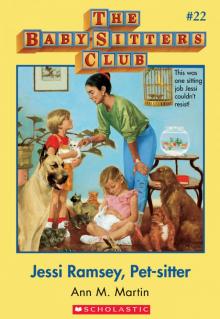 Jessi Ramsey, Pet-Sitter
Jessi Ramsey, Pet-Sitter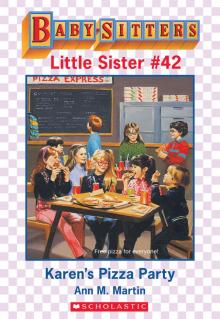 Karen's Pizza Party
Karen's Pizza Party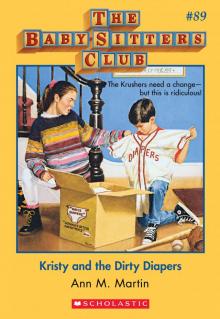 Kristy and the Dirty Diapers
Kristy and the Dirty Diapers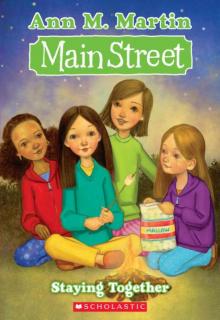 Staying Together
Staying Together Dawn and the Surfer Ghost
Dawn and the Surfer Ghost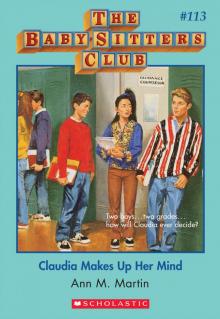 Claudia Makes Up Her Mind
Claudia Makes Up Her Mind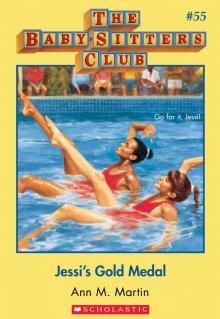 Jessi's Gold Medal
Jessi's Gold Medal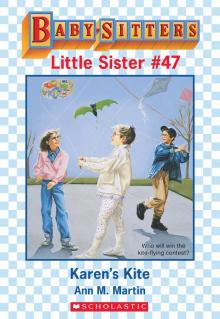 Karen's Kite
Karen's Kite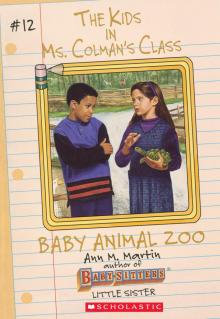 Baby Animal Zoo
Baby Animal Zoo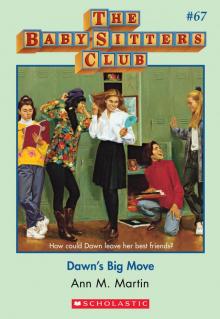 Dawn's Big Move
Dawn's Big Move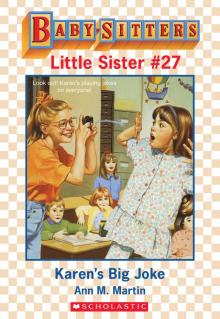 Karen's Big Joke
Karen's Big Joke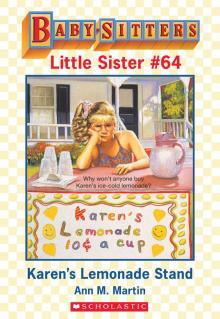 Karen's Lemonade Stand
Karen's Lemonade Stand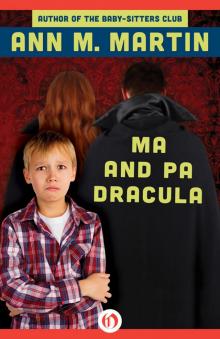 Ma and Pa Dracula
Ma and Pa Dracula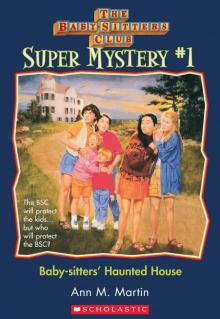 Baby-Sitters' Haunted House
Baby-Sitters' Haunted House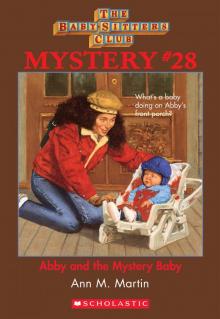 Abby and the Mystery Baby
Abby and the Mystery Baby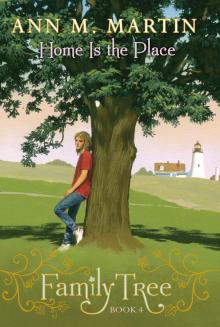 Home Is the Place
Home Is the Place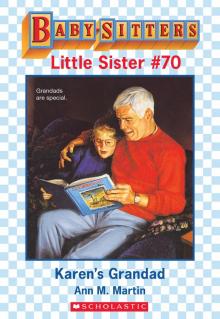 Karen's Grandad
Karen's Grandad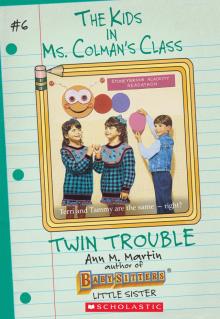 Twin Trouble
Twin Trouble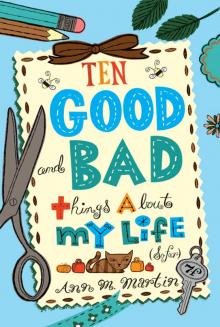 Ten Good and Bad Things About My Life (So Far)
Ten Good and Bad Things About My Life (So Far)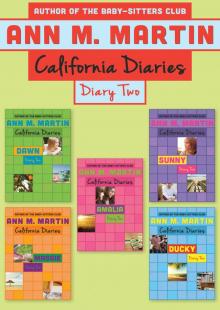 Diary Two
Diary Two Baby-Sitters Club 027
Baby-Sitters Club 027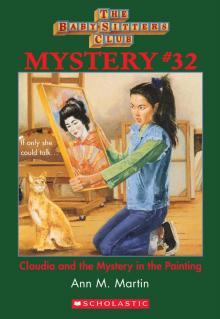 Claudia and the Mystery Painting
Claudia and the Mystery Painting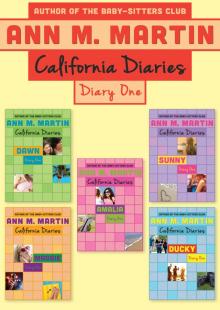 Diary One
Diary One Baby-Sitters Club 037
Baby-Sitters Club 037 Baby-Sitters Club 028
Baby-Sitters Club 028 Baby-Sitters Club 085
Baby-Sitters Club 085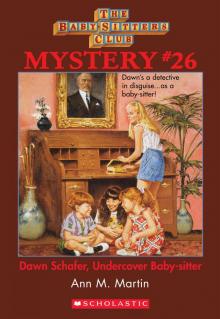 Dawn Schaffer Undercover Baby-Sitter
Dawn Schaffer Undercover Baby-Sitter Jessi's Babysitter
Jessi's Babysitter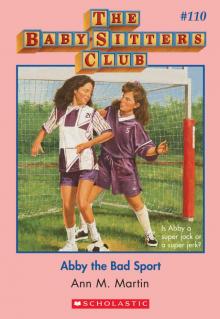 The Baby-Sitters Club #110: Abby the Bad Sport (Baby-Sitters Club, The)
The Baby-Sitters Club #110: Abby the Bad Sport (Baby-Sitters Club, The) Karen's Little Sister
Karen's Little Sister Baby-Sitters Club 058
Baby-Sitters Club 058 Claudia And The Genius On Elm St.
Claudia And The Genius On Elm St.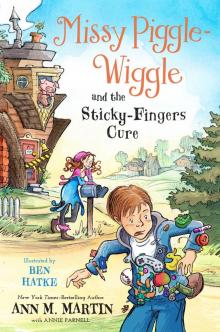 Missy Piggle-Wiggle and the Sticky-Fingers Cure
Missy Piggle-Wiggle and the Sticky-Fingers Cure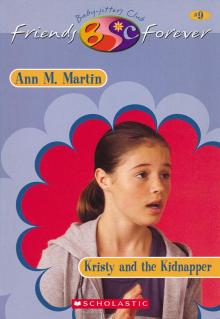 Kristy and Kidnapper
Kristy and Kidnapper Baby-Sitters Club 041
Baby-Sitters Club 041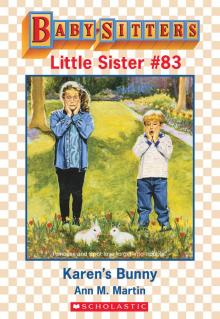 Karen's Bunny Trouble
Karen's Bunny Trouble Baby-Sitters Club 032
Baby-Sitters Club 032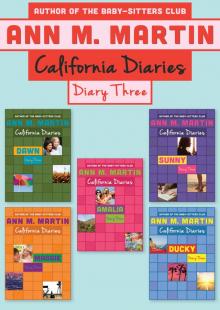 Diary Three
Diary Three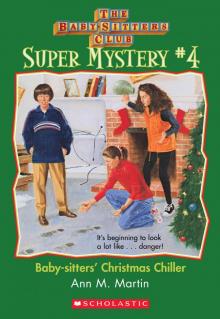 Christmas Chiller
Christmas Chiller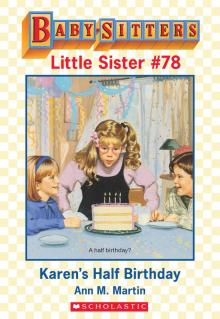 Karen's Half-Birthday
Karen's Half-Birthday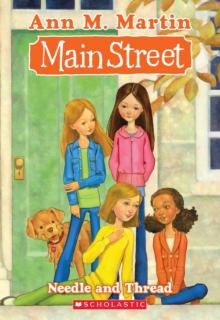 Needle and Thread
Needle and Thread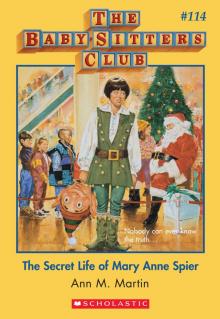 Secret Life of Mary Anne Spier
Secret Life of Mary Anne Spier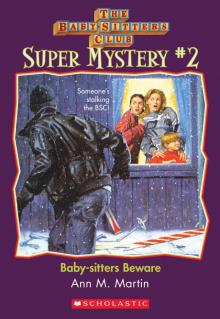 Baby-Sitters Beware
Baby-Sitters Beware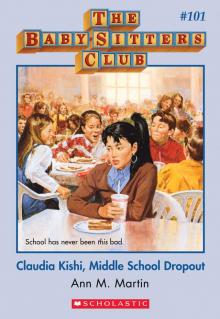 Claudia Kishi, Middle School Drop-Out
Claudia Kishi, Middle School Drop-Out Logan Likes Mary Anne !
Logan Likes Mary Anne ! Baby-Sitters Club 061
Baby-Sitters Club 061 Best Friends
Best Friends Baby-Sitters Club 031
Baby-Sitters Club 031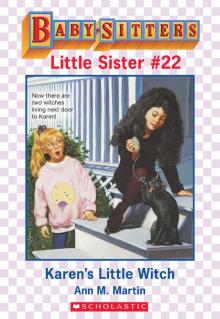 Karen's Little Witch
Karen's Little Witch Jessi Ramsey, Petsitter
Jessi Ramsey, Petsitter Baby-Sitters Club 123
Baby-Sitters Club 123 Baby-Sitters Club 059
Baby-Sitters Club 059 Baby-Sitters Club 033
Baby-Sitters Club 033 Baby-Sitters Club 060
Baby-Sitters Club 060 Baby-Sitters Club 094
Baby-Sitters Club 094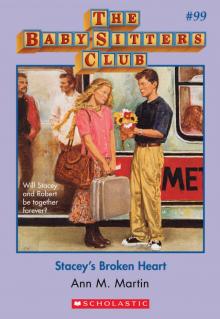 The Baby-Sitters Club #99: Stacey's Broken Heart
The Baby-Sitters Club #99: Stacey's Broken Heart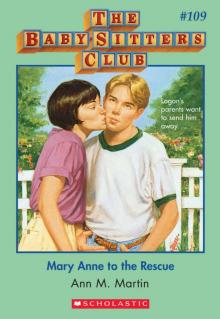 The Baby-Sitters Club #109: Mary Anne to the Rescue (Baby-Sitters Club, The)
The Baby-Sitters Club #109: Mary Anne to the Rescue (Baby-Sitters Club, The) Mystery At Claudia's House
Mystery At Claudia's House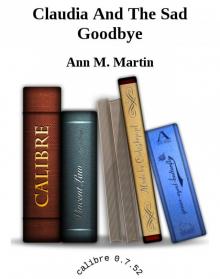 Claudia And The Sad Goodbye
Claudia And The Sad Goodbye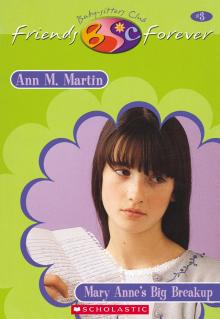 Mary Anne's Big Break-Up
Mary Anne's Big Break-Up Baby-Sitters Club 025
Baby-Sitters Club 025 Baby-Sitters Club 042
Baby-Sitters Club 042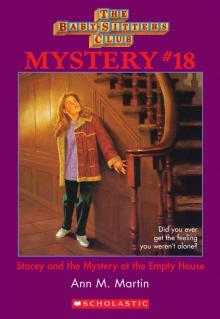 Stacey and the Mystery of the Empty House
Stacey and the Mystery of the Empty House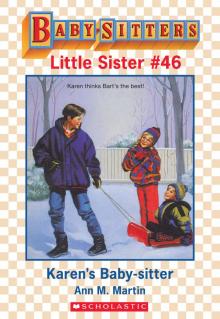 Karen's Baby-Sitter
Karen's Baby-Sitter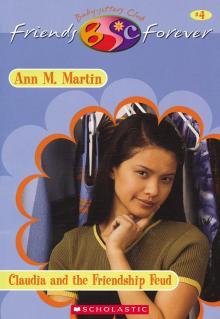 Claudia's Friendship Feud
Claudia's Friendship Feud Baby-Sitters Club 090
Baby-Sitters Club 090 Baby-Sitters Club 021
Baby-Sitters Club 021 Baby-Sitters Club 056
Baby-Sitters Club 056 Baby-Sitters Club 040
Baby-Sitters Club 040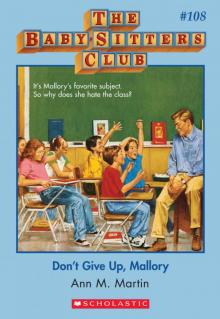 The Baby-Sitters Club #108: Don't Give Up, Mallory (Baby-Sitters Club, The)
The Baby-Sitters Club #108: Don't Give Up, Mallory (Baby-Sitters Club, The)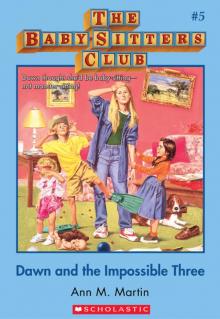 Dawn and the Impossible Three
Dawn and the Impossible Three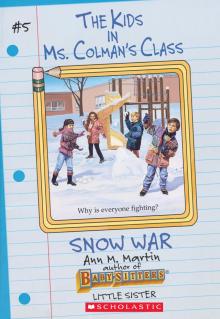 The Snow War
The Snow War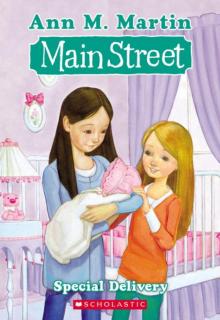 Special Delivery
Special Delivery Baby-Sitters Club 057
Baby-Sitters Club 057 Mary Anne And Too Many Babies
Mary Anne And Too Many Babies Baby-Sitters Club 030
Baby-Sitters Club 030